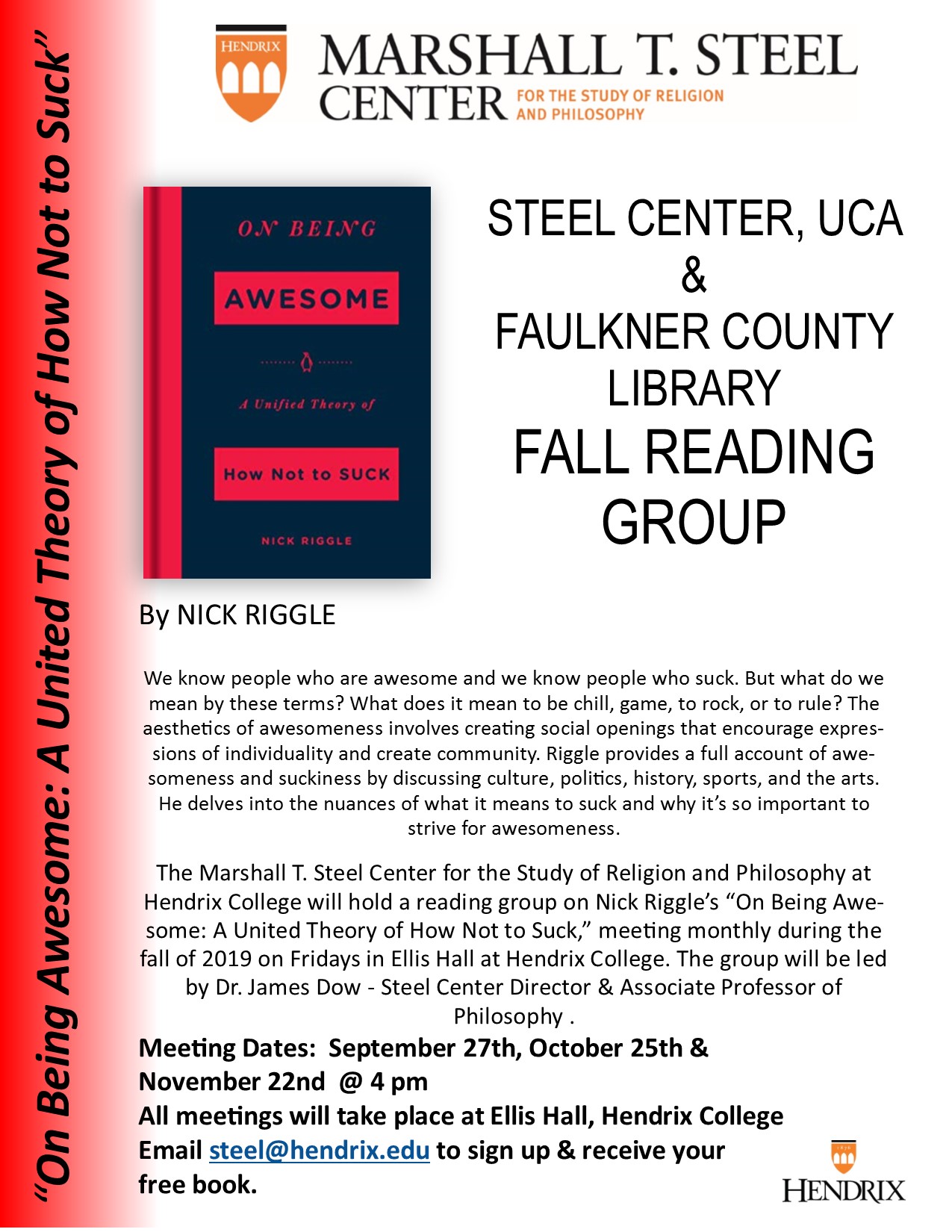To the Hendrix Community,
Upcoming Events
SPRING 2025 SCHEDULE
Bridges Across Beliefs: An interfaith conversation about community and spirituality
Join us for an interfaith panel organized by Hendrix Senior, Connor Rennels ('25), featuring Reverend Patricia Matthews, Episcopal Diocese of Arkansas, Imam Muhammed Nawaz, Madina Institute, & Rabbi Barry Block, Congregation B'nai Israel. This event is free and open to the public.
Wednesday, April 30th at 3:30 p.m. in Reves Recital Hall in Trieschmann Fine Arts Building
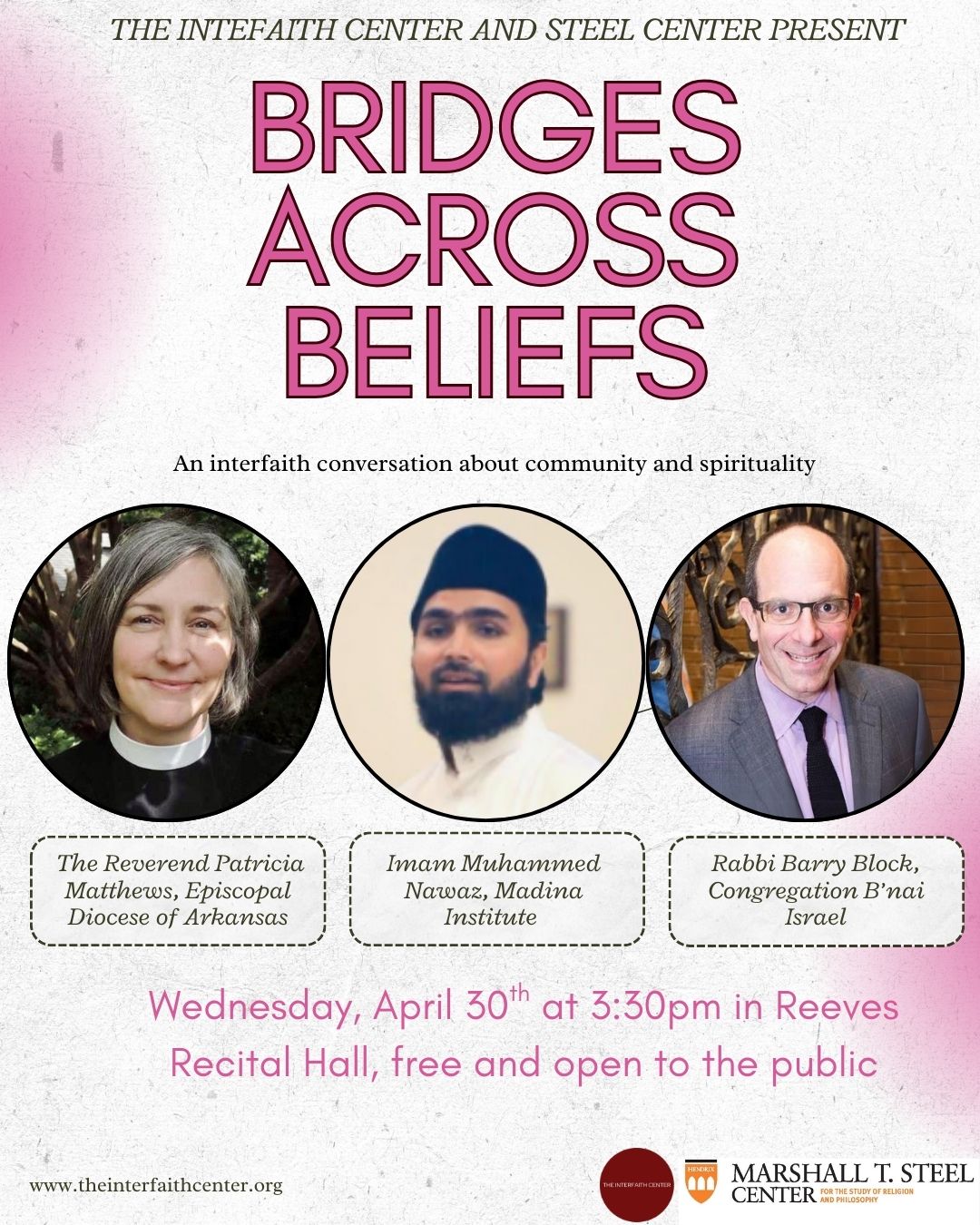
The Cost of Free Land: Jews, Lakota, and an American Inheritance Altheimer Lecture
Join award-winning author Rebecca Clarren for a lecture and conversation about the entangled history of her Jewish immigrant ancestors and their Lakota neighbors in the American West. Clarren's award-winning work of history and journalism The Cost of Free Land: Jews, Lakota and an American Inheritance reveals how federal policies that helped her homesteading family came at great cost to Native Americans and grapples with what we living in America today can do about the harmful history of American dispossession of Indigenous land. Her lecture will include slides, readings and a Q & A. She'll be glad to sign books after the event.
Rebecca Clarren has been writing about the American West for more than twenty-five years but it took her a very long time to realize that she was not an unbiased outsider when reporting on Native Nations, as she did for High Country News, The Nation and Indian Country Today. In fact, America had given her great-grandparents free land as part of the homestead act; land that our country had taken from the Lakota Nation. In this intimate discussion, Clarren will instruct participants in how to find themselves in this American history, identify the ways they or their family's benefitted or were harmed from federal policy and help identify ways to grapple with the past in a culturally-resonant context.
Rebecca Clarren is the winner of the 2021 Whiting Nonfiction Grant for her work on The Cost of Free Land. Her journalism, for which she has won the Hillman Prize, an Alicia Patterson Foundation Fellowship, and ten grants from the Fund for Investigative Journalism, has appeared in such publications as Mother Jones, High Country News, The Nation, and Indian Country Today. Her debut novel, Kickdown (Sky Horse Press, 2018), was shortlisted for the PEN/Bellwether Prize.
Thursday, March 6th, 7 p.m., in Reves Hall in Trieschmann Fine Arts Building
Online Recording: https://youtu.be/ShjxveMl-4w?si=g-D-oF0-4z88EPnW
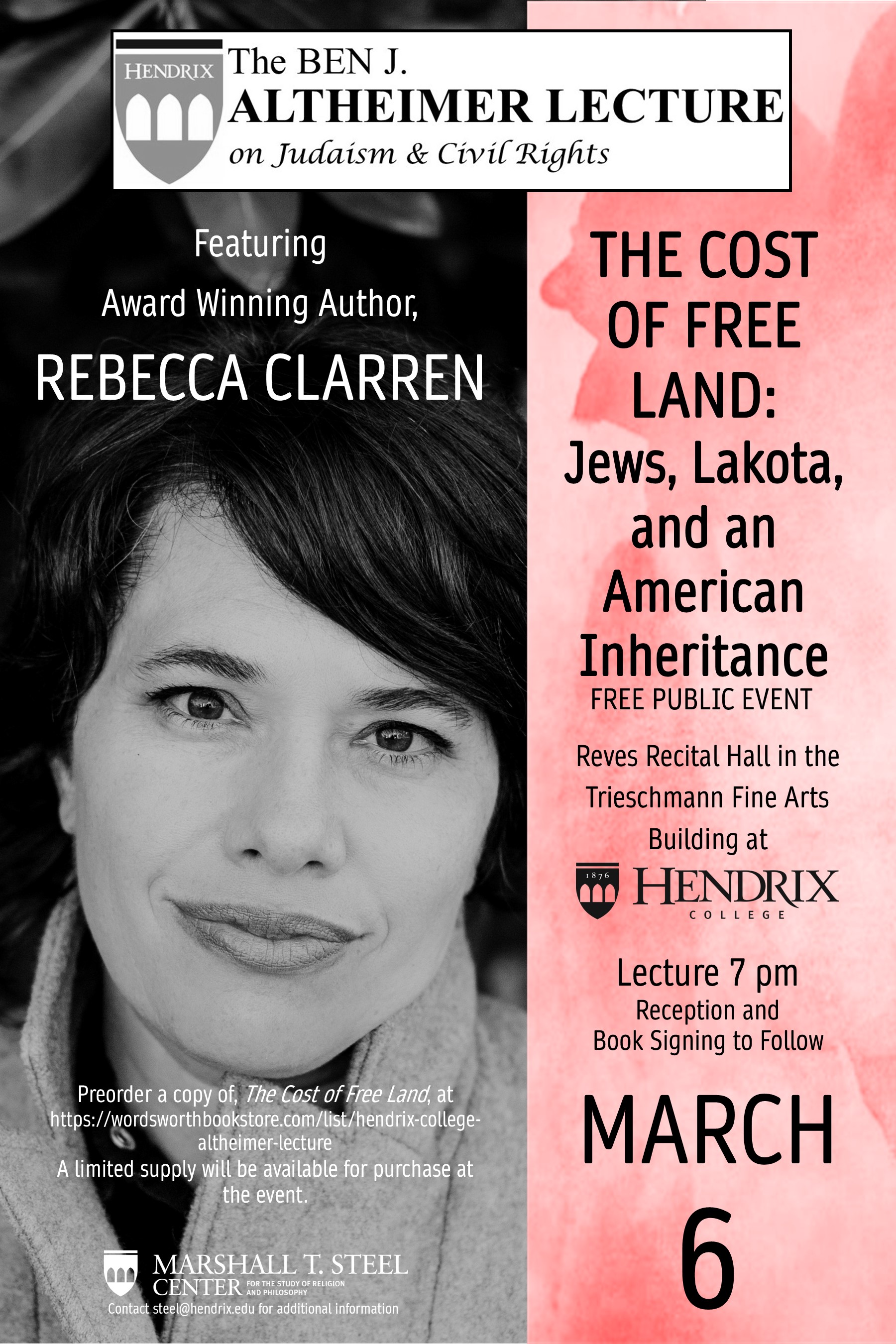
40th Annual Steel-Hendrix Awards Banquet, honoring Jerry Burns, Patty Barker, and Andrea Boston '21
In 1984, Hendrix College inaugurated the annual Steel-Hendrix Award Lectureship to celebrate 100 years of its official relationship with the United Methodist Church. The award was named in honor of Marshall T. Steel, a prominent minister and former president of the College. The Marshall T. Steel Center will honor three persons for their exemplary faith-based service at the 2025 Steel-Hendrix Awards Banquet, set for Tuesday, February 25th, at 5:30 p.m. in Worsham Student Performance Hall of the Student Performance Hall of the Student Life and Technology Center. Banquet tickets are $25 with advance purchase required by Monday, February 10th.
Further information can be found in this news article and on the Religious Life website. To purchase tickets using a credit card (fees apply), click here. To pay by check, please email mulhearn@hendrix.edu.
Tuesday, February 25th, 5:30 p.m., in Worsham Hall located in the Student Life and Technology Center

The Cost of Free Land: Jews, Lakota, and an American Inheritance Reading Group
The Altheimer Endowed Lecture Series is hosting author, Rebecca Clarren, on campus March 5-8, 2025! Clarren will be featured at the Altheimer Lecture and other community events. You can be part of the reading group on Clarren's book, "The Cost of Free Land" by signing up now (and receiving your free book). The group will meet once on February 25th at 4:10 pm in Ellis Hall. Leading the group, Dr. Dorian Stuber and Dr. Marianne Tettlebaum on behalf of the Altheimer Lecture Series and the Steel Center. Sign up by visiting Ellis Office 108. Books are limited so sign up soon!
Tuesday, February 25th, 4:10 - 5:30 p.m., in Ellis Hall
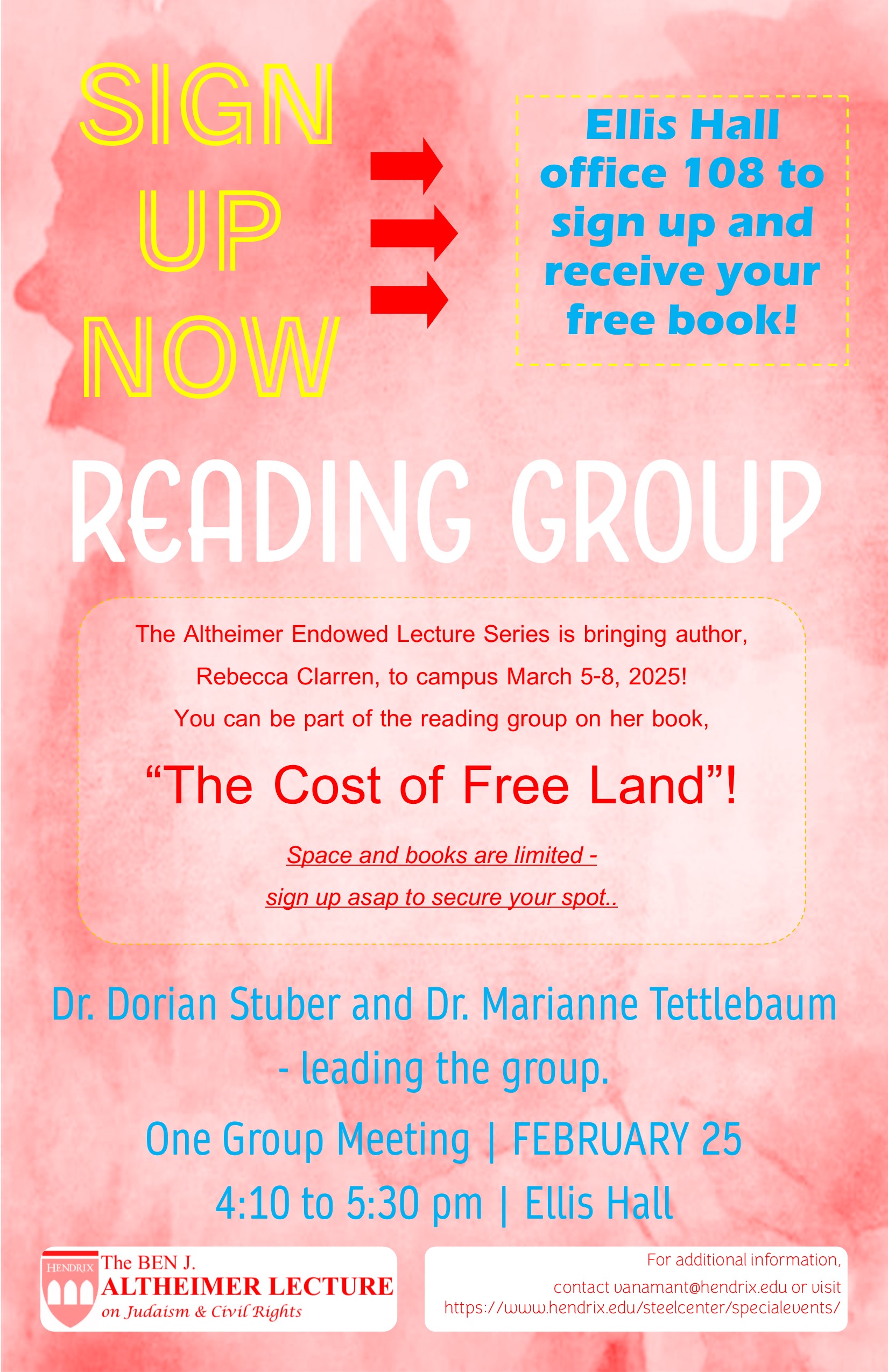
PAST EVENTS
FALL 2024 SCHEDULE
End of Semester "Philosophy Symposium"
Enjoy dinner and conversation with the Philosophy Faculty, Philosophy Students, and their friends. Registration is required by 5 PM, November 24. Click here to register for the event.
Wednesday, December 4th, 6-8 pm in Ellis Hall
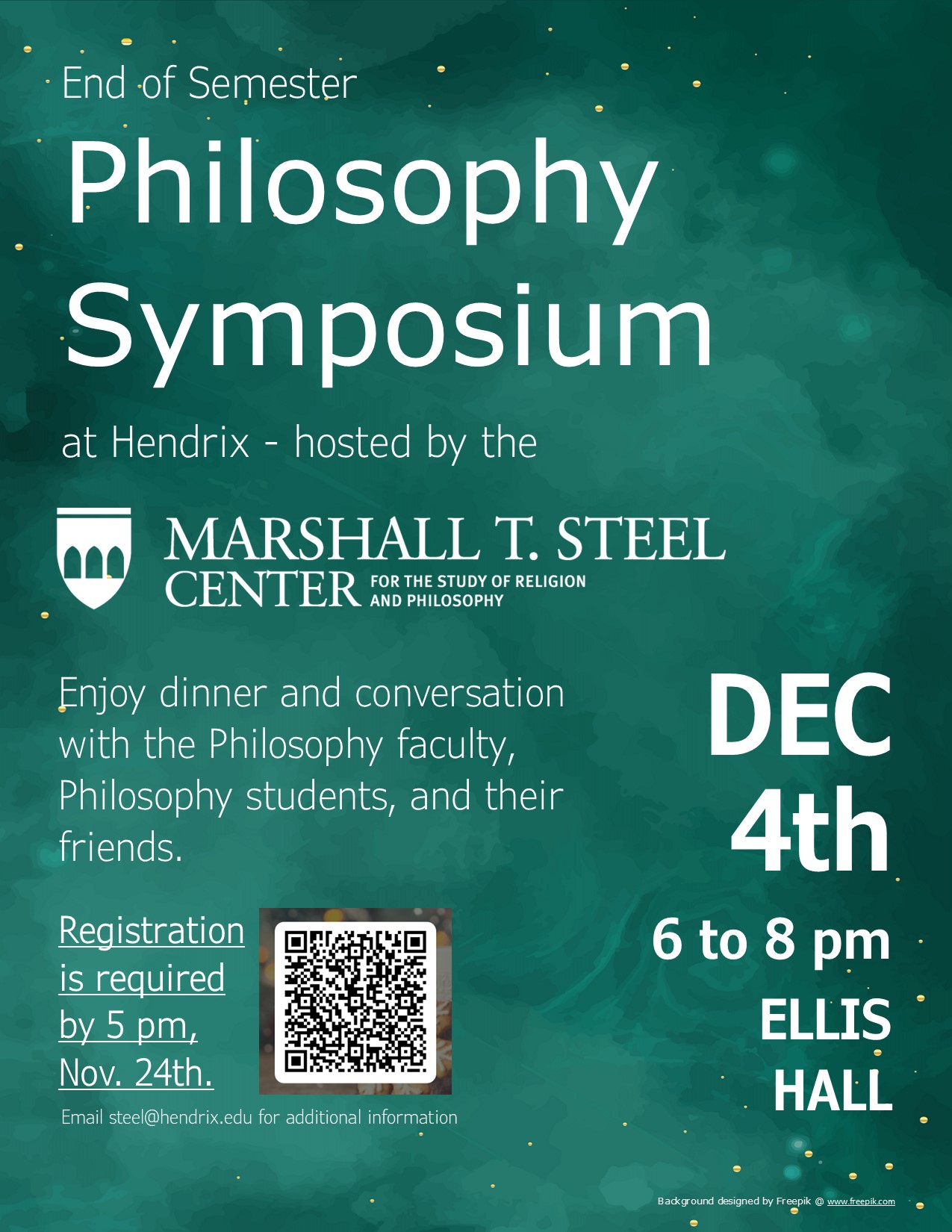
“Matter”, Ellis Hall Exhibit Opening Event and Discussion, featuring Curator Sydney Austen '25
An opening event for the new Ellis Hall exhibition at Hendrix College, “Matter,” will be held on Friday, September 27th from 4 to 5 pm. Student curator Sydney Austen will lead a discussion of the works and introduce participants. The art exhibit explores the concept of material culture, which covers any object that humans use to define their lives, relationships, identities, or beliefs. Composed of everything from coins to cookware, material culture illustrates the connection between humans and the environment through the objects that we find meaningful. Our possessions, in many ways, define who we are. Works in this exhibit question how we separate art from artifact and form from function. In an era focused on commodity and short-lived products, “Matter” presents art that expresses how objects come alive with cultural, and personal, significance.
The exhibit features five artists, working in various mediums, whose works explore a unique aspect of material culture:
Fabiola Gironi is a contemporary artist from Milan, Italy, currently residing in Los Angeles. She primarily works in painting and drawing. Prompted by her experiences of motherhood, the Covid-19 pandemic, and a lifetime of international travel, Gironi’s recent body of work focuses on still-lifes and interiors that explore the transient nature of “home.” Her pieces Chimera and Archetype feature objects that exemplify her life as an Italian woman and as a mother.
Caleb Cole is a Midwest-born, Boston-based artist whose work addresses the opportunities and difficulties of queer belonging. Using collage, assemblage, photography, and video, they bring secondhand objects and media together for chance encounters, deliberately placing materials from different time periods into conversation as a means of considering a lineage of queer culture. Holecloth is a textile piece that visualizes the desire to preserve that which is missing or difficult to perceive.
Jordan Kornreich teaches painting and drawing in the Department of Art & Design at Binghamton University. He is a visual artist and educator from Ithaca, NY. Kornreich’s most recent series of drawings explore the idea of moving between homes. These moments of transition remind the viewer of the impermanence of existence in the world. His piece, Ghost, centers on the ideas of presence and absence, identity and transience, gain and loss, isolation, vulnerability, resilience, and independence.
Kathleen Thum is an Associate Professor of Drawing at Clemson University in upstate South Carolina. Her widely exhibited drawings, paintings, and wall installations explore the ongoing shifting of power between mankind and Earth. Thum began collecting carbon matter after spending time in Wyoming at an artist residency. Given the state’s reputation for its energy extraction of “clean” coal, Thum became curious about coal as an object with physical qualities that could be understood through art. Her works, Wyoming Coal #1 and #4, depict pieces from her collection that exemplify the complex history of coal.
Nathan Gorgen and Molly Jo Burke are an artist and designer couple and parents of young children, who collaborate on artwork as Byproduct Studios. Based in Ohio, their collaborative work raises issues of environmentalism and waste, and the nature of the materials and objects that surround their everyday lives. With their newest series, they have begun to use the objects they collect in their family life, such as unused children's items and leftover components from home improvement projects. Their pieces Domesticus Nature Morte I, II, & III feature low-relief still lifes inspired by their children, whose freedom in artmaking cause them to see everything in their environment as a potential sculpture.
This event is free and open to the campus community and the public.
Friday, September 27th, 4:10 - 5:10 p.m., in Ellis Hall
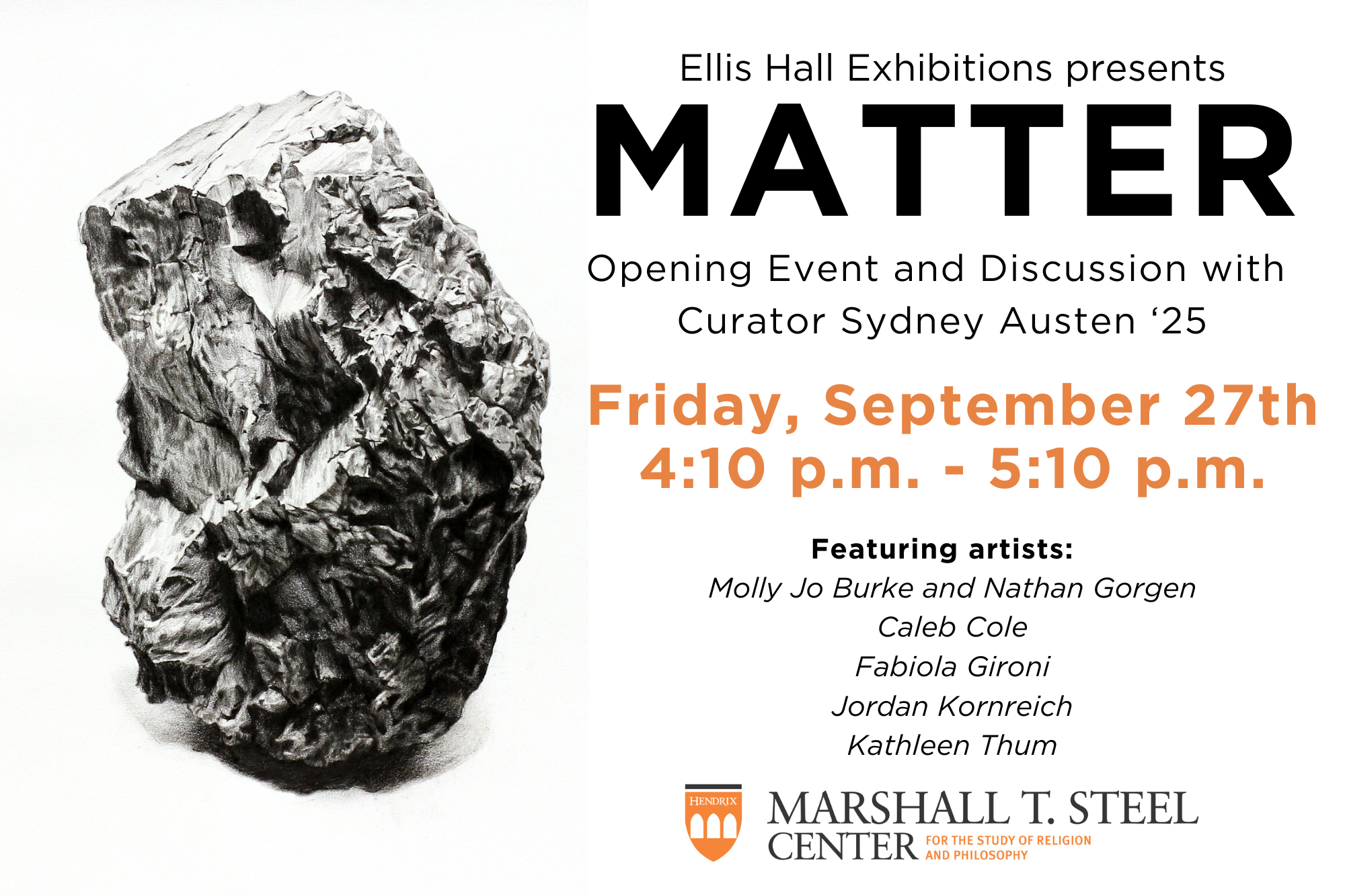
PAST BIBLE STUDY MEETINGS
FALL 2023-SPRING 2024
August 29th, "The 'Second' Biblical Account of Creation" (Genesis 2-3)
Sept. 5th, "The Fall of Humankind" (Genesis 3)
Sept. 12th, "Resisting Pharaoh"
Sept. 19th, "Saving Moses"
Sept. 26th, "The Economics of Pharaoh (Exodus 5)
Oct. 10th, "Debt Forgiveness" (Deuteronomy 15)
Oct. 17th, "The Year of Jubilee" (Leviticus 25)
Oct. 24th, "Economic Justice in the Hebrew Prophets"
Oct. 31st, "Jesus and Economic Justice: The Gospel of Luke"
Nov. 7th, "Jesus and Economic Justice: The Rich Young Ruler and the Rich Fool"
Nov. 14th, "Jesus and Economic Justice: The Lord's Prayer"
Nov. 28th, "Jesus and Economic Justice: The Sheep and The Goats"
January 30th, "The Gospel of Mark"
February 6th, "Their Faith Has Made You Well"
February 13th, "The Parable of the Sower"
February 20th, "Gerasene Demoniac"
March 5th, "A Political Reading of the Gospel of Mark"
March 12th, "A Political Reading of the Gospel of Mark, cont."
March 26th, "Parodying the Royal Processional" (Mark 11:1-11)
April 2nd, "Easter without Jesus" (Mark 16:1-8)
April 9th, "Easter Without Jesus, cont."(Mark 16:1-8)
Spring 2024
Steel Center Lecture featuring Steel Center Visiting Scholar, Nathan Duford, Assistant Professor of Government at Smith College, on Domination and Identity Politics. Open to the public and the Hendrix community.
This discussion will present a variety of argumentative tactics used by right-wing political organizations and social movements that generate both negative and positive depictions of identity politics. In the negative terms, these depictions rely on the generation of false equivalencies between identities, or the depiction of left-wing identity politics as sophisticated ploys for authority and control. I read billboards, editorials, posts (formerly known as tweets), flyers, and protest signs to demonstrate how these specific tactics function to undermine left-wing identity politics. The paper will look at four forms of positive right-wing identity politics analyzed through protest signs, flyers, memes, book covers, forum posts, vehicle signage, and posts (formerly known as tweets).
Rather than making academic arguments, these media are intended to mobilize grassroots support for a variety of social movements or solidarity groups which aim at domination. I pull from white power/white pride, straight/cis pride, pro-patriarchy/men’s rights, and gender critical examples in order to demonstrate the various tactics deployed by right-wing identitarian movements. I argue that these tactics are intended to generate paranoia, a feeling of powerlessness, and a sense of righteous indignation in everyday political actors based on their identitarian identifications. Combined, these three psychopolitical states are operative in more mainstream forms of right-wing political action with grassroots support, such as anti-CRT legislation as well as recently revived forms of homo/trans moral panics leading to highly restrictive forms of legislation.
Thursday, April 25th, 7pm, in the Hundley Shell Theatre/Miller 100 (reception to follow)
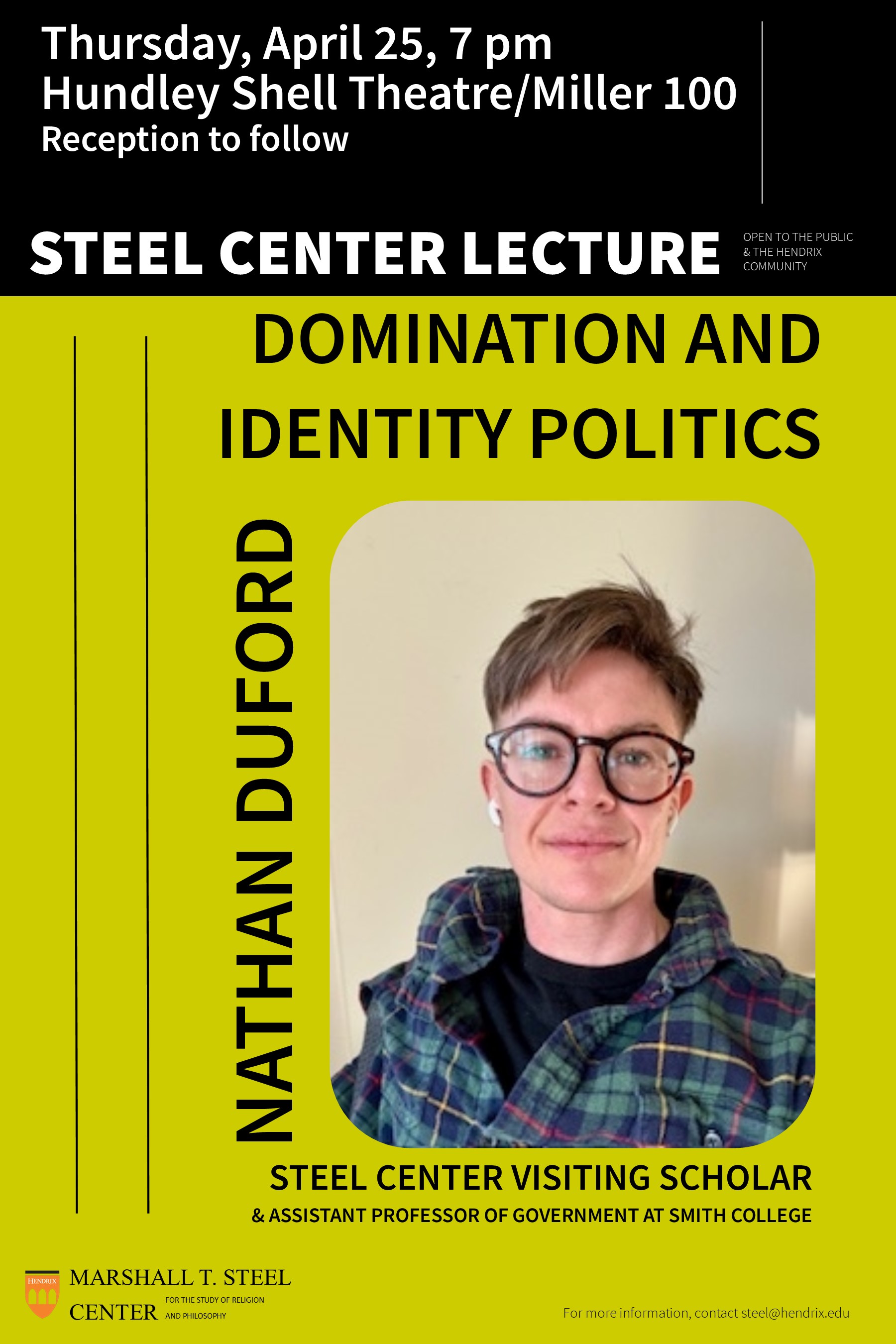
Brunch with Dr. Kenneth T. Andrews - Visiting Phi Beta Kappa Scholar
Professor Andrews, Tileston Professor of Arts and Sciences at Washington University in St. Louis, studies the influence of protest and social movements on politics, media, and social change, having written extensively on the dynamics and legacy of the Civil Rights Movement in the U.S. South. Andrews has studied the leadership, participation, and influence of environmental groups and the local state politics of prohibition as well. Currently, he is studying protest and activism in the period following the 2016 election. Andrew's research has been supported by multiple grants from the National Science Foundation, and he has held visiting fellowships at the Russell Sage Foundation, University of Oxford, and Wissenschaftszentrum Berlin feur Sozialforschung.
Monday, March 11th, 10:10 - 11:30 a.m. in Ellis Hall
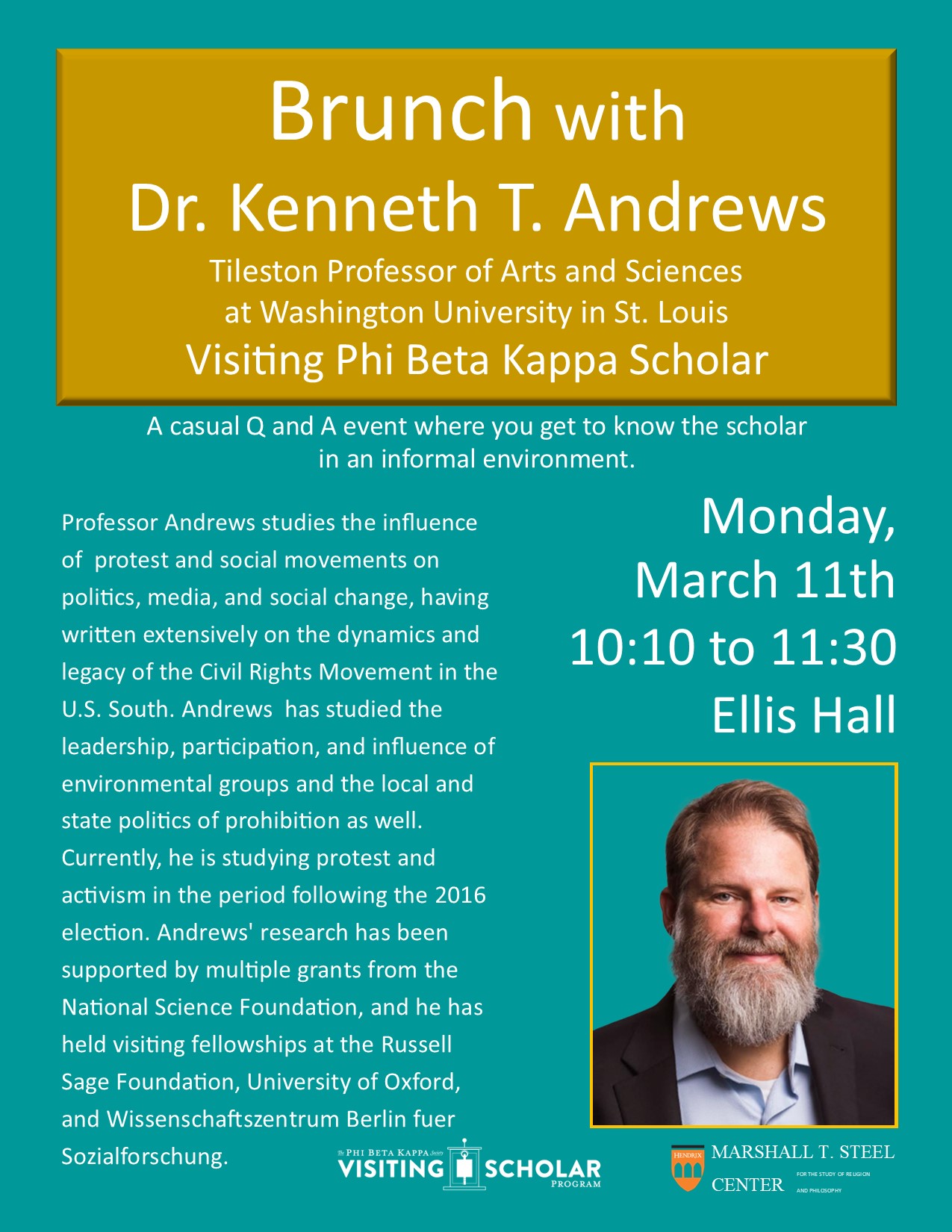
Live Musical Performance, "Untight", and Artist Talk featuring Sam King Exhibit "Useful Friction"
Untight is an improvisation-driven sound art project created and performed by Arkansas-based artist and musician Sam King. King combines a microtonal electric guitar with a digital effects array to create compelling, immersive listening experiences, accompanied in live settings by projections or other visual elements.
Thursday, February 22nd from 6:00 - 8:00 p.m. in Ellis Hall
.jpg)
Own Your Power, Rustin Film Screening
A gay, black, pacifist, with former communist ties before Stonewall and during the Civil Rights Movement, WWII, and the Red Scare, Bayard Rustin was no ordinary Civil Rights leader. Yet, because of his extraordinary organizing abilities, he was selected to organize the famous March on Washington, where his friend and mentee, Dr. King, gave his famous "Dream" speech. Join Dr. Justin Barringer, a published Rustin expert, and the Hendrix community for this celebration of Black history as we watch Oscar-nominated actor Coleman Domingo star in the film Rustin - produced by Barak and Michelle Obama.
Monday, February 19th, 2:00 P.M. in the Hundley Shell Theater in the Miller Creative Quad.
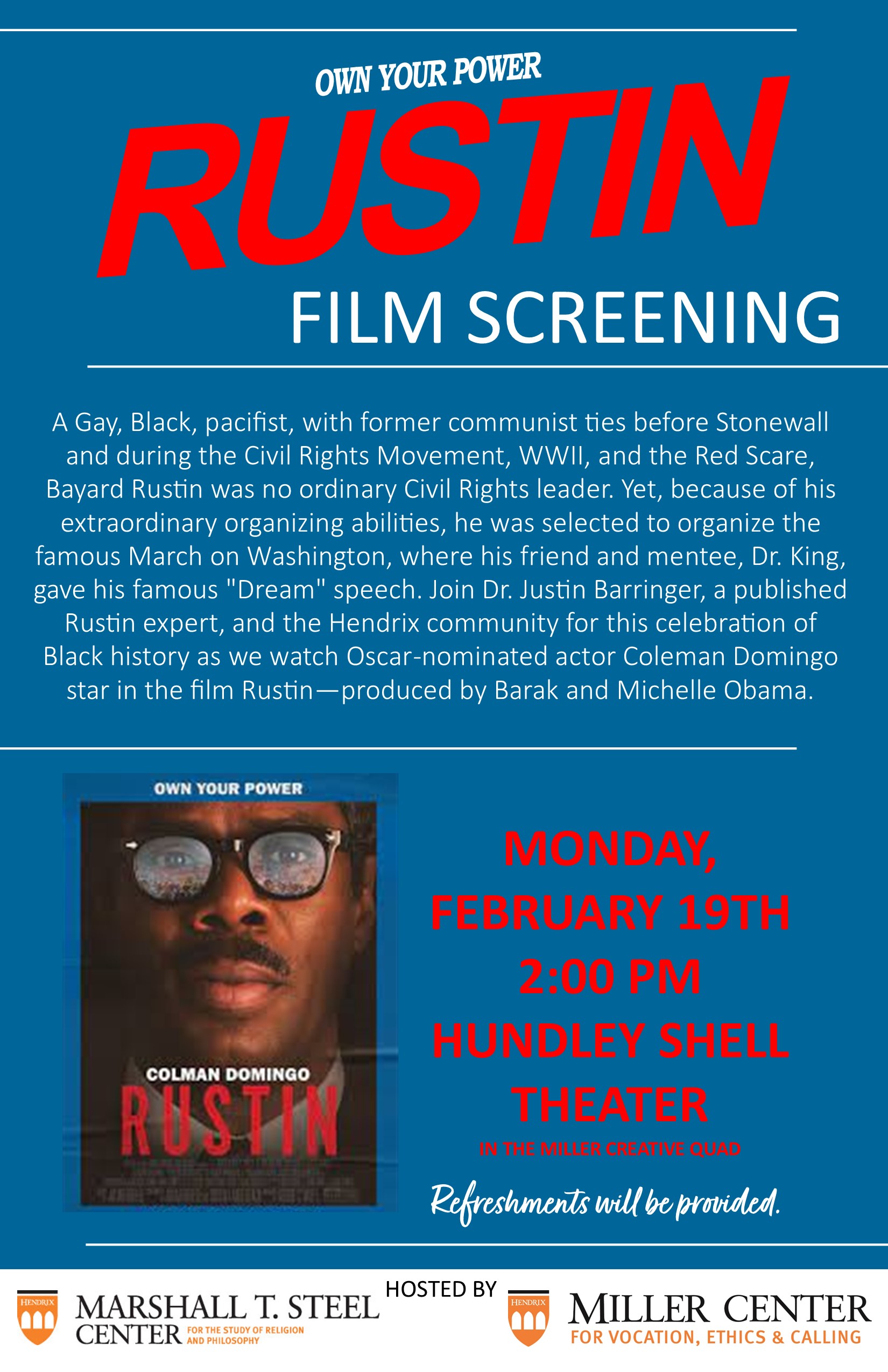
Fall 2023
The Social Face of Pandemics in East Africa and Beyond Lecture - Dr. Esther Mombo
Thursday, October 26th 7:00 pm - Mills A
Please join us in welcoming visiting scholar Dr. Esther Mombo, Kenyan religious historian and practitioner who works at the intersections of religion and health to the Hendrix campus. During this lecture Dr. Mombo will discuss how pandemics such as HIV/AIDS, Covid-19, and climate change exacerbate the social and material conditions for already marginalized communities and address ways we can confront those social epidemics.
.jpg)
News Release: https://www.hendrix.edu/esther-mombo-steel-center-lecturer/
Sam King “Useful Friction” Ellis Hall Exhibitions Opening and Discussion hosted by the Steel Center
Friday, September 22nd 4:10 to 5:10 pm – Ellis Hall
This event is free and open to the campus community and the public. Family Weekend Guests Welcome!
From Sam King:
Useful Friction
Useful Friction refers to the tension between intuitive and grid-based visual structures which drives the composition of my paintings, as well as the tension a viewer might feel when engaging paintings that do not represent familiar imagery. We tend to apply our perception for essential purposes: seeking food, shelter, safety, or pleasure, for example. With this habit as a default setting, perception for its own sake (or for some elusive end), might seem indulgent or unnecessary. I recognize metaphor in this contrast. Is a person’s value merely a reflection of their utility within a system, or can it be internally generated?
When I paint, I am pursuing meaningful relationships of color, line, shape, and material. My paintings are embodiments of experience: the passage of time, chance, change, and the formation and abandonment of habits. They are the results of a sustained program of improvisation. Paintings might be broken down and recombined over several years, with long intervals of time separating periods of focused work. There is metaphor in this, for me, as well. The self, in my view, is realized in negotiation with its context over time. It is a hub within a wider matrix of constantly changing connections.
The concept of useful friction applies as well to my guitar-based audio project, called Untight, in which I overlay harmonies produced using just intonation with the harmonies of standard, twelve tone equal temperament. Sometimes, notes using the two systems are similar enough that the listener would not notice any difference; other times, the notes beat against each other, creating a shimmering, sometimes disorienting sensation that is for many listeners not quite music, but not merely sound, either.
.jpg)
SPRING 2023
Tuesday, February 28th
Struggling with Statehood: Israel, American Jews, and the Palestinians after 1948- Steel Center Lecture, featuring Geoffrey Levin, PhD Hendrix Visiting Altheimer Scholar
Abstract
For centuries, being Jewish automatically meant being a minority, but with Israel’s birth, that suddenly changed. After 1948, Israel’s control over an Arab minority led American Jews to grapple with new dilemmas, which this talk will explore.
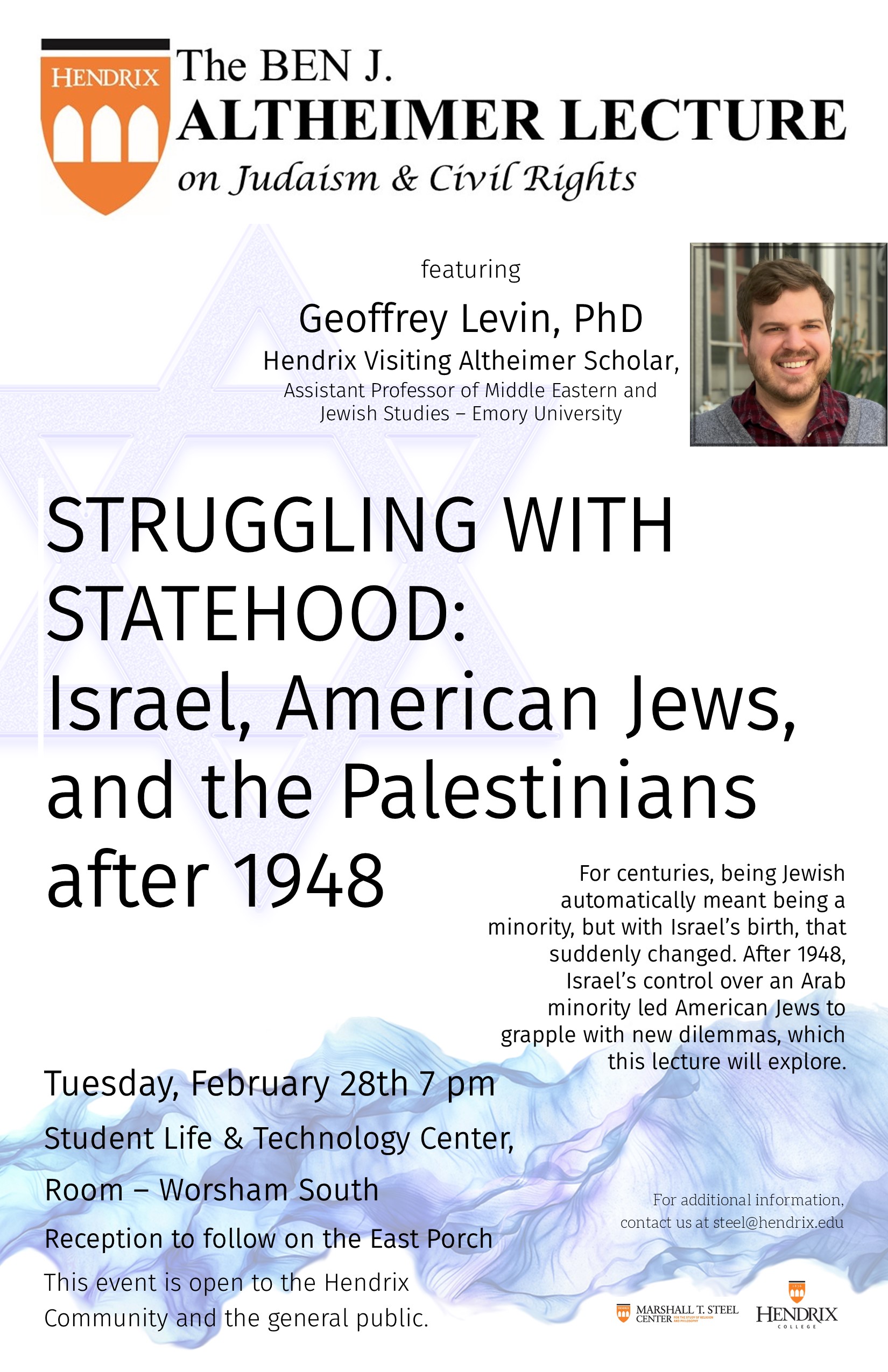
Tuesdays, 11:15-12:15
The Bible and Radical Politics, led by Professor Justin Barringer, Instructor of Religious Studies
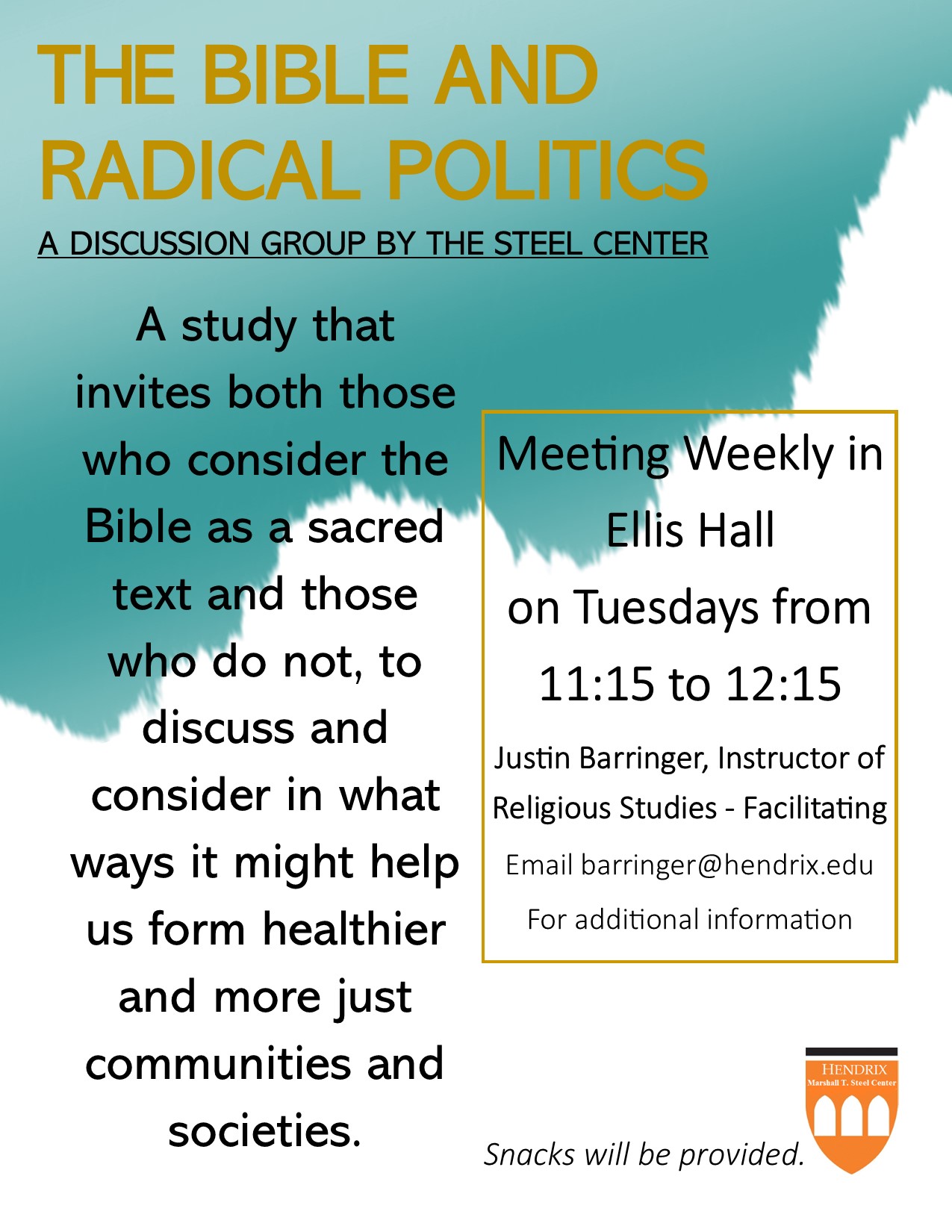
Thursday, Oct. 27th
Brunch Q&A, featuring Visiting Scholar Dr. Paul Katsfanas
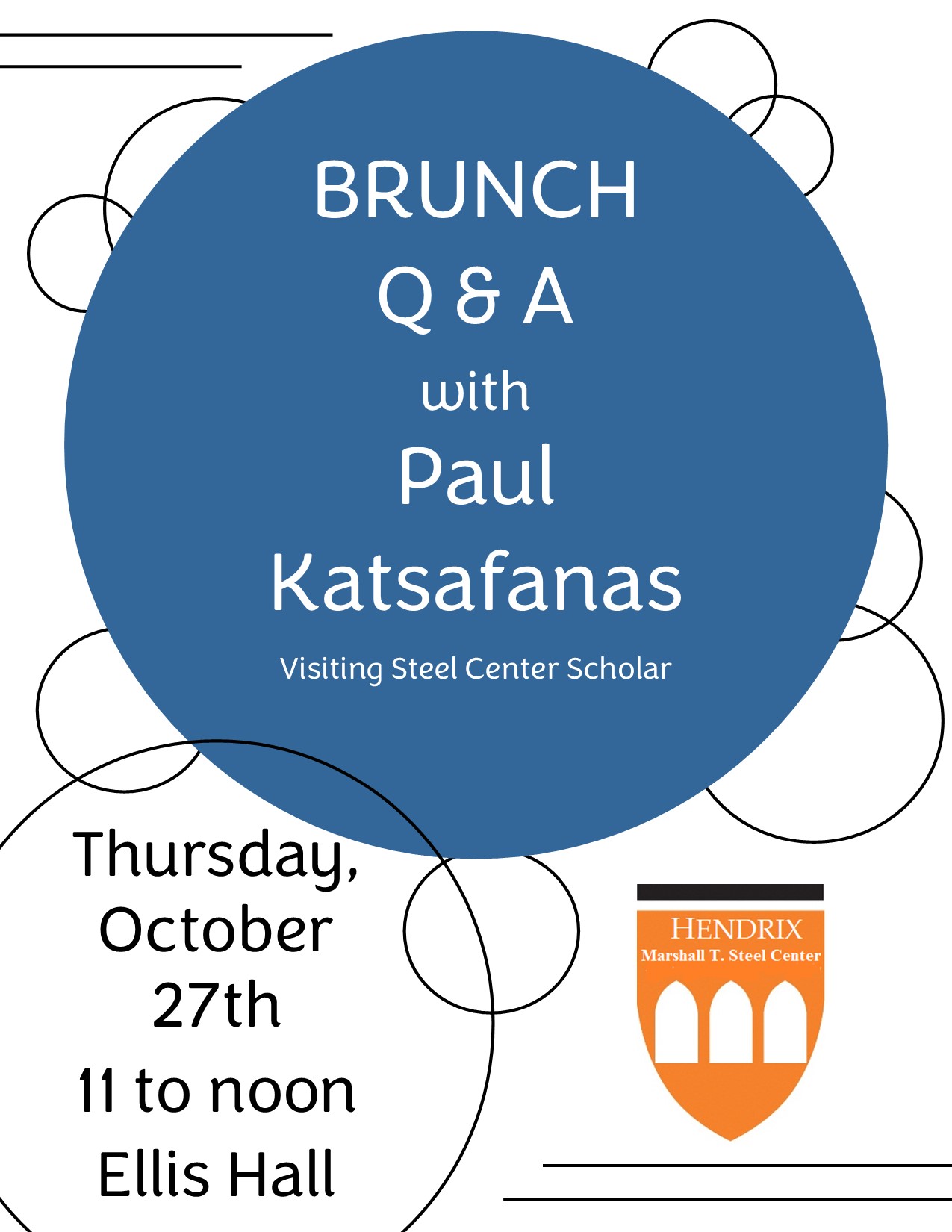
Thursday, Oct. 27th
Fanaticism and Resentment - Steel Center Lecture featuring Visiting Scholar, Dr. Paul Katsafanas
Abstract
What makes an individual or a group fanatical? How does fanaticism differ from other pathologies such as extremism, cultishness, and dogmatism? Dr. Paul Katsafanas, Professor of Philosophy and Director of Graduate Studies at Boston University, will explore the way in which fanaticism might be linked to resentment. Reception to follow. This event is open to the non-Hendrix community.
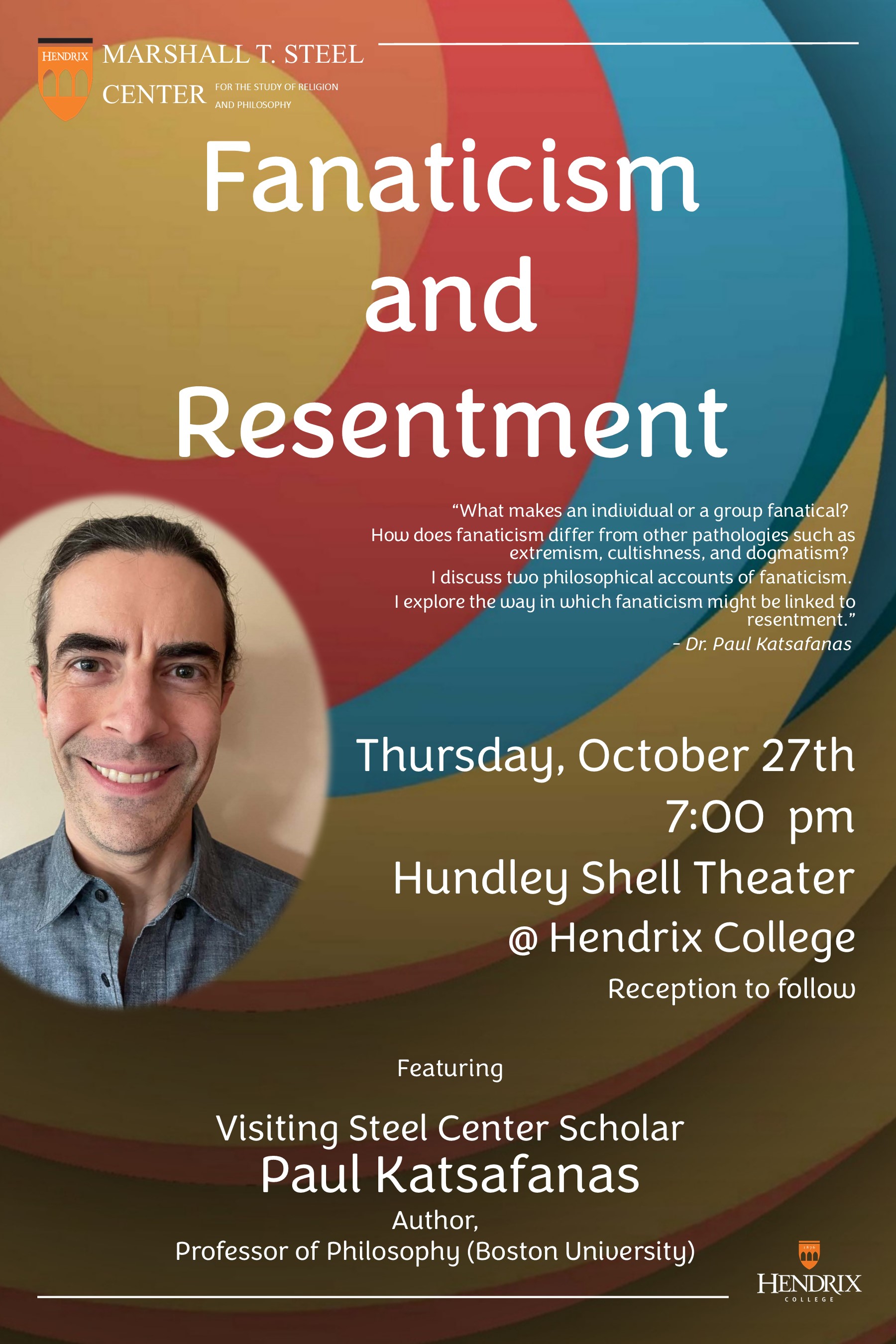
Friday, September 23rd
Expressing Nature’s Value
Abstract
Can we express the value of nature? Experiences of natural environments involve perceptions of the beauty of a flower, the sublimity of a tornado, the wonder of the starry sky. Some theorists have suggested that the value of nature outstrips artistic expression, that there’s always some color, some sound, some movement, or some power missing in attempts to represent nature. However, landscape artists have employed a variety of strategies for trying to capture the beauty, sublimity, and wonder of nature. Expressing Nature’s Value aims to highlight how there are diverse strategies in landscape painting that can be employed to highlight the value of nature. The Steel Center for the Study of Religion and Philosophy in Ellis Hall welcomes you to explore those strategies through the works of three artists from across the country that each create landscape works. Shannon Evans, Ginger Knowlton, and Cydney Williams each have two pieces in the Expressing Nature's Value exhibition. Expressing Nature’s Value will run for a year in Ellis Hall and the opening will be held from 4 pm to 5:30 pm on Friday, September 23rd in the Ellis Hall Living Room.
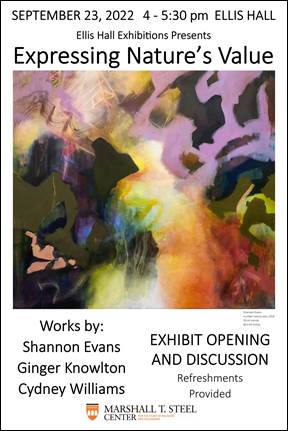
First Event of the Year!
Steel Center Meet & Greet!
Meet the Religious Studies and Philosophy Faculty, learn about the programs we offer and the ways you can become involved. Snacks and drinks provided! Ellis Hall Lawn 4:10 to 5:10 Wednesday, August 31st. All are welcome!
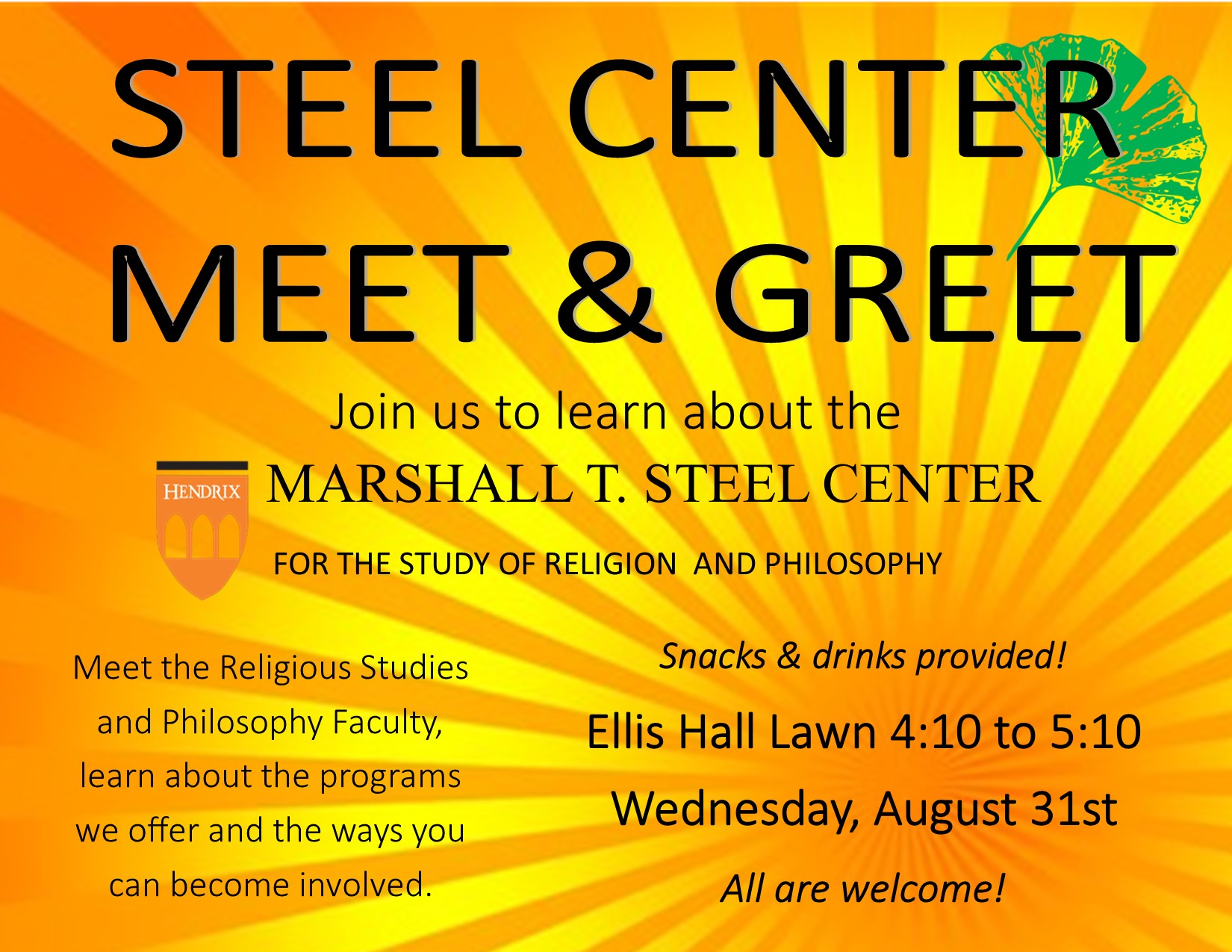
Summer News!
Happy Summer students, faculty, and staff! It has been a successful year of events and programming largely thanks to your thoughtful participation. We appreciate every attendee, contributor, and the perspectives they add to our events. If you would like a piece of the Steel Center to take with you this summer, we are currently accepting students for a new reading group. The book is by David Livingstone Smith titled, Less than Human: Why we Demean, Enslave, and Exterminate Others. Less than Human is the first book of its kind to discuss and theorize why we sometimes think of others as subhuman. Using history, evolutionary psychology, biology, anthropology, and philosophy, David Livingstone Smith provides a coherent interdisciplinary account of what dehumanization is, how it's used, and how to deconstruct it. The Steel Center will have dinner and discussion in the fall to discuss students' thoughts on the book, so be sure to grab a copy during finals week for summer reading! Email steel@hendrix.edu for more details!
2022 Events:
Steel Center Brunch with Bryan Van Norden
April 14th 11 am to noon, Ellis Hall
-For the Hendrix Community-
An opportunity to share food and conversation with Dr. Van Norden. No lecture or talk topic, just open discussion.
Bryan Van Norden Spring Lecture and Reception
April 14th 7 pm, Mills B, reception to follow in the Mills Library
Learning from Chinese Philosophy
When Europeans first encountered Chinese Confucians, Daoists, and Buddhists, they immediately recognized them as serious philosophers. However, this attitude changed due to the influence of imperialism and pseudo-scientific racism, so that (beginning with Kant) Chinese philosophy was dismissed and banned from academic philosophy in the West. Recently, works like my Taking Back Philosophy: A Multicultural Manifesto have challenged the status quo and demanded that we return to the cosmopolitan ideal of multicultural philosophy. This lecture provides several examples of the profound and distinct philosophical debates that existed in China on issues such as consequentialism, human nature, ethical egoism, relativism, and skepticism.
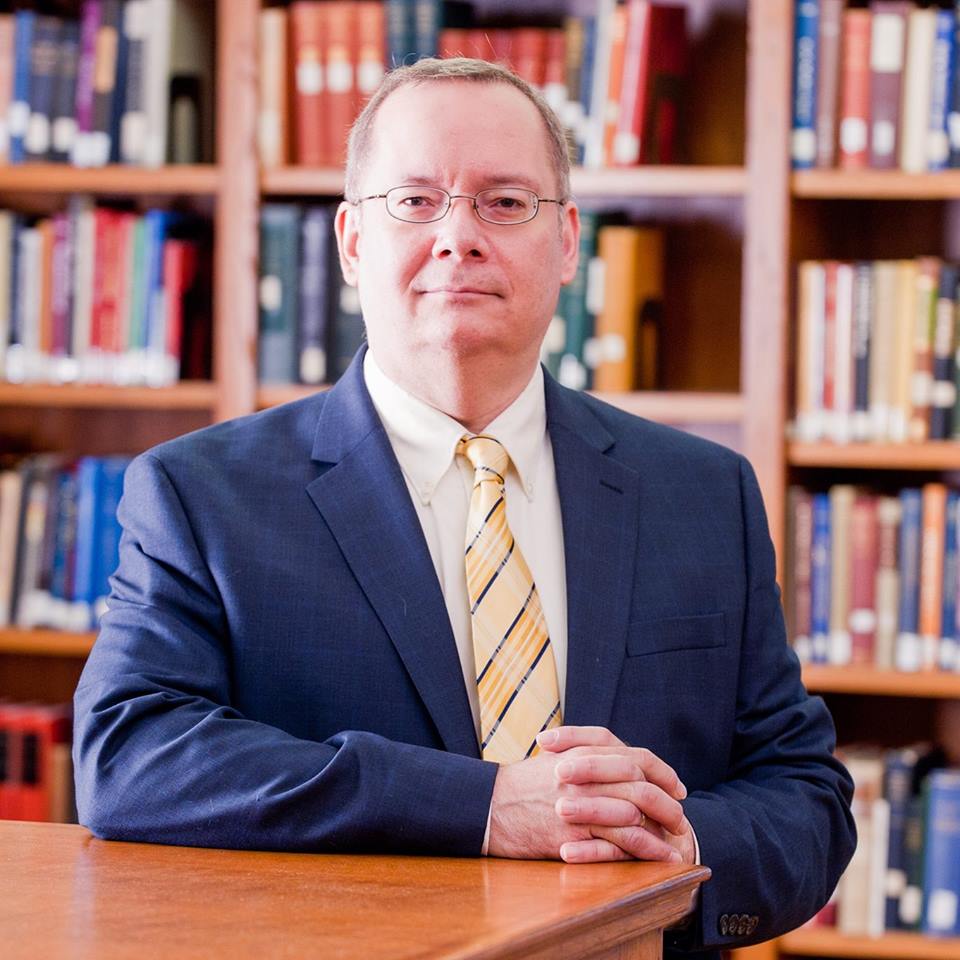
Worldview Porch Brunch
Thursday, March 10th 11-12pm
For the Hendrix Community - Open discussion of our perspectives on reality, knowledge, and values. All points of view are welcome (and snacks are provided).
.jpg)
"Should Nietzsche Be Canceled?" Lecture and Discussion
Featuring Carl Sachs PhD, Assistant Professor of Philosophy at Marymount University (Arlington, VA)
Thursday, February 3rd 11:15 am- 12:15 pm Ellis Hall (In-person and via Zoom)
To obtain the zoom link in advance, email steel@hendrix.edu.
Abstract
Friedrich Nietzsche is one of the most frequently taught philosophers and often engaged students with his irony, wit, and subversive humor. For many decades, Nietzsche's influence on Nazis and other fascists has been downplayed or ignored. Yet recent scholarship on Nietzsche has argued that Nietzsche's 'dark side' is ignored only at a terrible cost. On this reading, Nietzsche believed that slavery is the basis of culture and hated the rise of liberal democratic societies in which slavery was abolished. His critique of Christianity is based on a critique of the moral system in which slavery is seen as morally wrong -- a moral system that was invented by the slaves for their own benefit. This strand of Nietzsche's thought not only inspired the Nazis but also influences contemporary neo-fascists, reactionaries, and influential figures on the "alt-right". If Nietzsche's thought is seducing people to reject the basic principles of liberal democracy, is it morally irresponsible for us to teach Nietzsche to college students? Does Nietzsche's dark side affect how we ought to teach Nietzsche, if indeed we should?
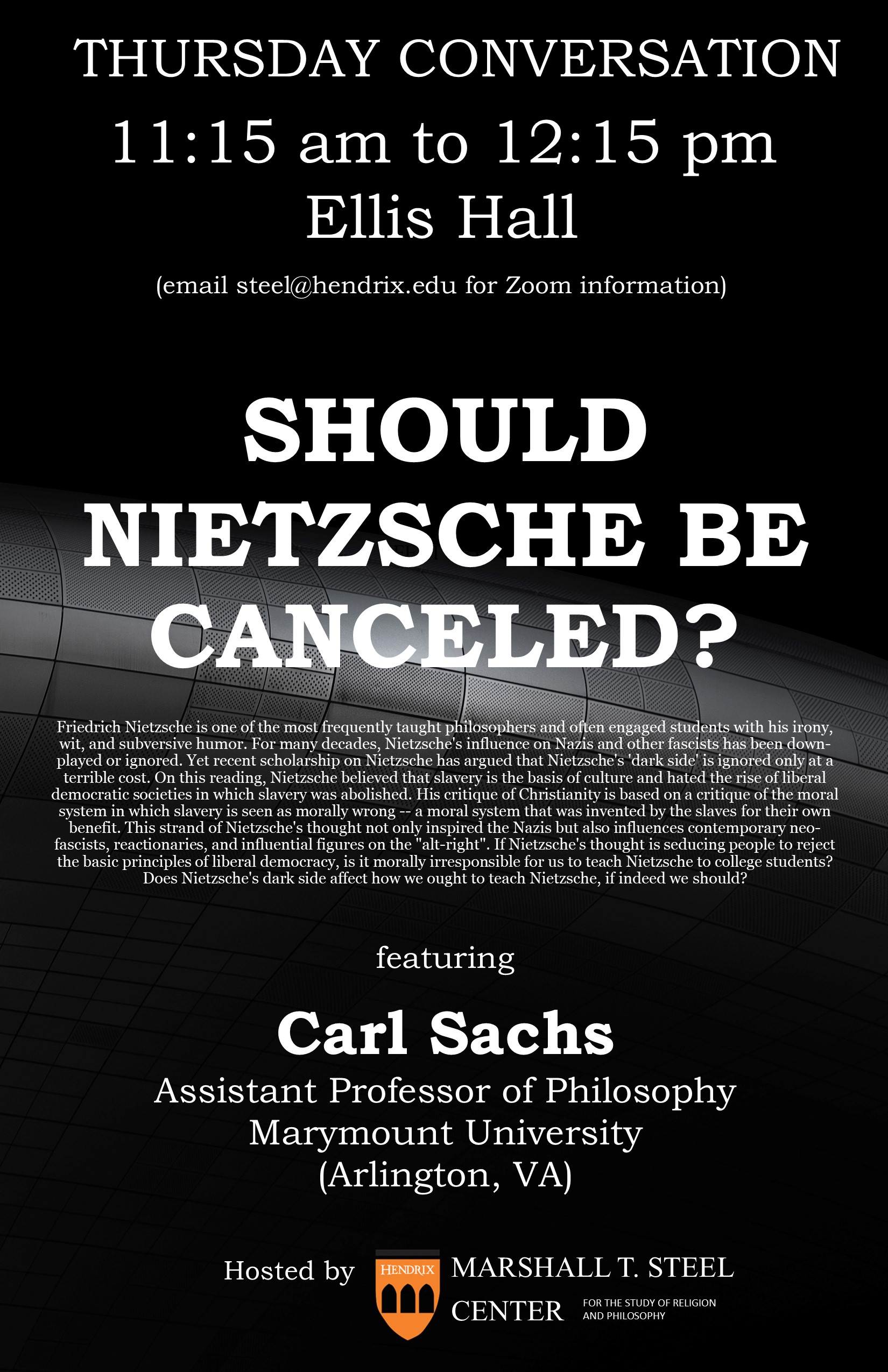
2021 Events:
Aesthetic Agency? The Authority Approach Steel Center Lecture
Featuring Steel Center Visiting Scholar, Dr. Keren Gorodeisky, Author & Professor of Philosophy (Auburn University)
Thursday, November 11th 7 pm Worsham Hall (limited to 50 guests), Reception to follow
Abstract
Engagements with aesthetic value pervade human life. We choose to wear these shoes because they beautifully match the dress; we travel to Petra on account of its beauty or we love Michaela Cole’s TV show, I May Destroy You, as powerful and deep. Our aesthetic engagements appear to be as significant to our lives as human beings as our theoretical inquiries and practical pursuits. But is there anything worthy of the name aesthetic agency?
Until very recently, there has been no discussion of aesthetic agency. This is likely because aesthetics has traditionally focused not on action, but on appreciation, while the standard approach identifies ‘agency’ with the will, and more specifically, with the capacity for intentional action and voluntary control. In this lecture, I argue, first, that this identification is unfortunate since it fails to do justice to the fact that we standardly attribute beliefs, emotions, desires and other attitudes that aren’t formed ‘at will,’ including aesthetic appreciation, to people’s agency. Fortunately, we need not abide by this Practical Approach, but can develop an alternative: the Authority Approach to rational agency, which I defend in this lecture. This is great news for aesthetics, I argue additionally, because any account of aesthetic agency that accepts the Practical Approach and focuses on aesthetic actions fails to provide a genuine notion of aesthetic agency. This is because we have no handle on what counts as aesthetic actions independently of these actions’ relation to appreciation: actions are “aesthetic” only derivatively insofar as they center around things that merit (dis)appreciation. For this reason, we have genuine aesthetic agency only if we can exercise agency in appreciating, which is not an exercise of the will. Since the Authority Approach allows us to explain how we exercise agency in aesthetic appreciation, it equips us with a genuine conception of aesthetic agency.
Lecture will be available via Zoom as well, register in advance by emailing steel@hendrix.edu.
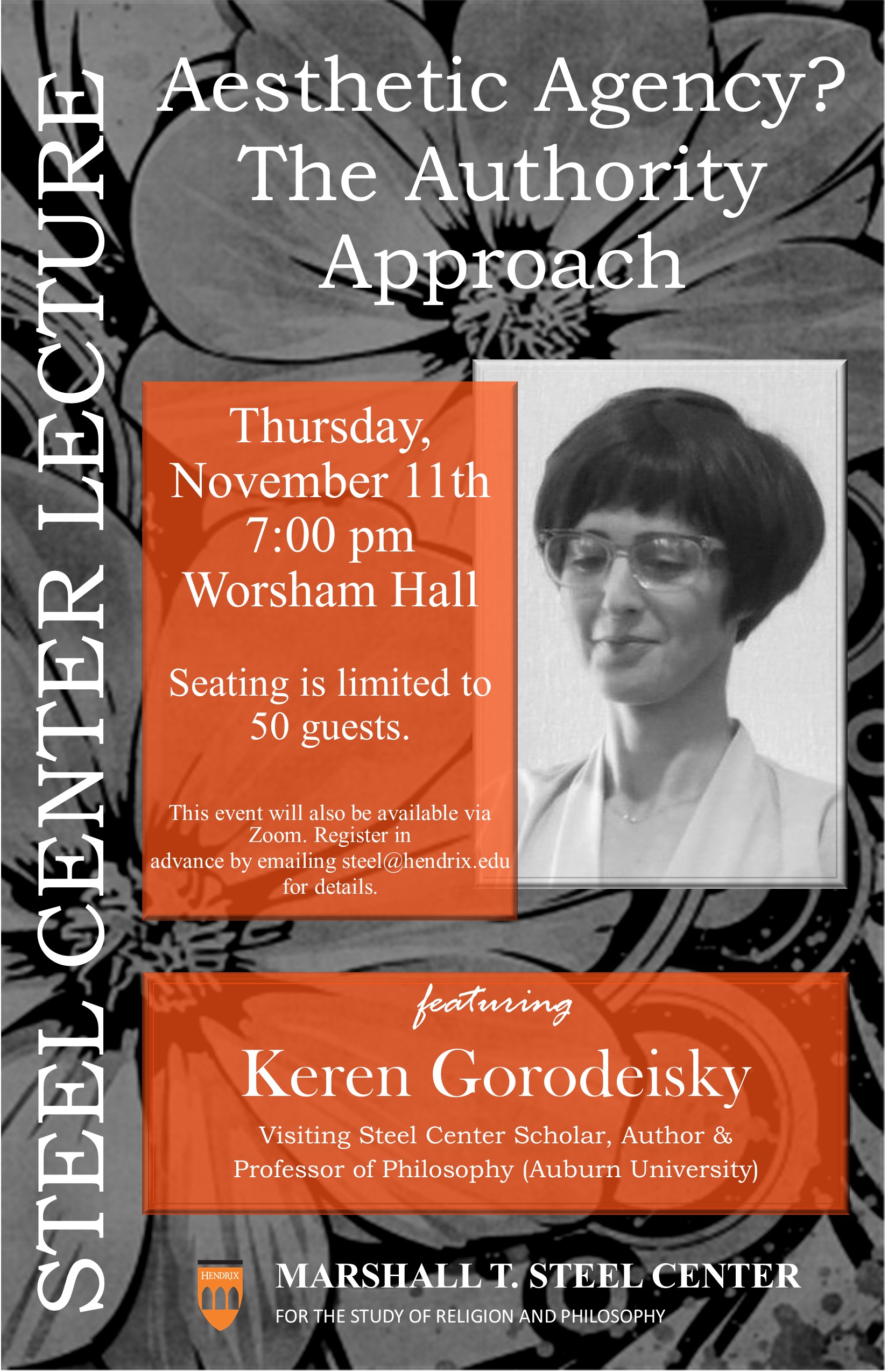
Worldview Porch Brunch
Thursday, October 27th noon to 1pm
For the Hendrix Community - Open discussion of our perspectives on reality, knowledge, and values. All points of view are welcome (and snacks are provided).
.jpg)
![]()
![]()
2021 Events:![]()
Steel Center Visiting Scholar Dr. Reggie Williams to Speak at Two Online Events, March 17 and 18Hendrix College welcomes expert on Dietrich BonhoefferCONWAY, Ark. (March 9, 2021) — The Marshall T. Steel Center for the Study of Religion and Philosophy at Hendrix College welcomes Reggie Williams, Ph.D., associate professor of Christian ethics at McCormick Theological Seminary, as its Steel Center Visiting Scholar for 2021. His visit will occur remotely due to COVID-19 restrictions; nevertheless, he will speak at two Hendrix-based events, both of which are free and open to the public:· Wednesday Afternoon Discussion/Virtuous Conversations Series, 4:10 to 5:10 p.m. CDT: “Learning to Be Troubled: Dietrich Bonhoeffer’s Experience in Harlem”· Steel Center Lecture on Thursday, March 18, 2021, 7:15 to 8:15 p.m. CDT: “What Killed Dietrich Bonhoeffer?”Dr. Williams’ book Bonhoeffer’s Black Jesus: Harlem Renaissance Theology and an Ethic of Resistance (Baylor University Press, 2014) was selected as a Choice Outstanding Title in 2015 in the field of religion. The book analyzes German pastor and theologian Dietrich Bonhoeffer’s exposure to Harlem Renaissance intellectuals, and worship at Harlem’s Abyssinian Baptist Church, during his year of post-doctoral study at Union Seminary in New York, 1930-31. Williams will focus on this particular time in Bonhoeffer’s life, and how it influenced his resistance of the Nazi regime, for the content of the Wednesday Afternoon Discussion.In addition to Bonhoeffer, Williams’ research interests include Christological ethics, theological anthropology, Christian social ethics, the Harlem Renaissance, race, politics and black church life. His current book project includes a religious critique of whiteness in the Harlem Renaissance. In addition, he is working on a book analyzing the reception of Bonhoeffer by liberation activists in apartheid South Africa.Williams received his Ph.D. in Christian ethics at Fuller Theological Seminary in 2011. He earned a master’s degree in theology from Fuller in 2006 and a bachelor’s degree in religious studies from Westmont College in 1995. He is a member of the board of directors for the Society for ChristianEthics, as well as the International Dietrich Bonhoeffer Society. He is also a member of the American Academy of Religion and Society for the Study of Black Religion.While both events are free, pre-registration is required for access to the Zoom platform. Email steel@hendrix.edu by noon on the day of the event to make a reservation and receive event access.
The Nazi forces that Bonhoeffer opposed were a local, historical manifestation of lethal ideas that predated Hitler’s regime, and outlived it. For consideration of who we must be, today, in order to oppose those forces, it matters that we ask, not “who” killed Bonhoeffer, but, “what” killed him?
2021 Steel-Hendrix Awards Announced
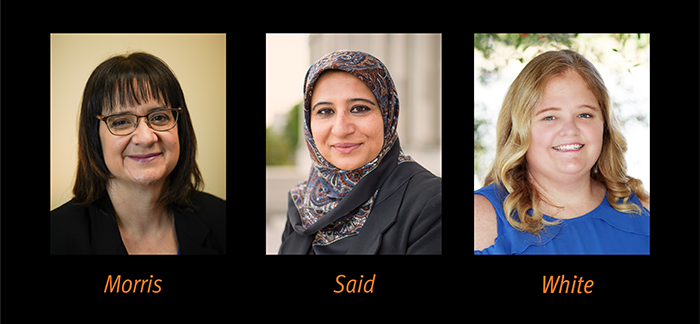
CONWAY, Ark. (March 4, 2021) — The Marshall T. Steel Center for the Study of Religion and Philosophy at Hendrix College will present the 36th Annual Steel-Hendrix Awards to the Rev. Dr. Michelle J. Morris, Sophia Said, and Jennifer White. Because of pandemic restrictions on gatherings, these extraordinary church and community leaders will receive this year’s awards remotely, in a ceremony that will premiere Monday, March 29, at 4 p.m. on the Steel Center Facebook page and the Hendrix College YouTube Channel.
Information about the Steel-Hendrix Awards and each award’s recipient follows:
The Rev. Dr. Michelle Morris – The Mary and Ira Brumley Award for Religious Education
The Rev. Dr. Michelle J. Morris is an ordained elder in the Arkansas Conference of the United Methodist Church. She has served congregations in West Memphis and Fort Smith, and now serves as an Associate Pastor overseeing the digital campus of First UMC Conway. She has also worked on staff in the Arkansas Conference, focusing on church revitalization and new church starts. That work gave rise to Gospel Discipleship, two books (a participant guide and congregation guide) which helps people understand their discipleship in terms of defining paths spelled out in each of the four Gospels.
Also during her time on the Conference staff, Morris oversaw the design and launch of the Arkansas Conference’s online learning system, CouRSe, which provides free online courses to anyone. When COVID-19 broke out, she also coordinated the Conference webinar responses. She directs the Arkansas Course of Study for local pastors and teaches at the regional course of study at Perkins School of Theology at SMU in Dallas.
Morris holds two degrees from the University of Arkansas – a Bachelor of Arts in English and French and a Master of Arts in Comparative Literature. She also has her M.Div. and a Ph.D. in Religious Studies (emphasis New Testament), both from SMU in Dallas. Morris writes for the Adult Bible Studies curriculum and is one of the writers for the CEB Women’s Bible. She is passionate about connecting people to Jesus in meaningful ways, and loves to help people gain a deeper understanding of their discipleship.
Sophia Said – The Ethel K. Millar Award for Religion and Social Awareness
Sophia Said is the Executive Director of the Interfaith Center in Little Rock, Arkansas. She has helped establish this outreach ministry to build bridges of peace and understanding and enhance public dialogue among different faith communities.
Said designs and implements interfaith initiatives in order to educate people about the various faith traditions and promote interfaith dialogue and awareness. She has provided community leadership by exemplifying interfaith cooperation skills through several of her programs, including interfaith summer camp for youth, interfaith youth group for teens, educational classes and workshops for adults, interfaith prayer events, interfaith supper club, and much more. She has also increased awareness about the rights of immigrants and religious minorities by educating and bringing diverse communities together in Arkansas.
Sophia is also the founder of Madina Institute, a mosque in Little Rock committed to the principles of compassion, education, illumination, and inclusion, serving the spiritual, social, and educational needs of a growing Muslim population in Little Rock.
Born and raised in Pakistan, Sophia moved to United States for higher education. She graduated summa cum laude from the University of Utah in 2007 with a degree in economics. She has a master’s degree from the Clinton School of Public Service and has worked as a strategic adviser and gender based economic development consultant locally and internationally.
A recipient of the Humanitarian of the Year award from Just Communities of Arkansas, the Peacemaker of the Year award from Arkansas Coalition of Peace and Justice, and several other awards from local and state-based organizations, Said is committed to creating peaceful, diverse communities based on the principles of coexistence and pluralism.
Jennifer White – Hendrix College Youth Minister of the Year
Jennifer “Pooh” White was born and raised in Stuttgart, Arkansas, and has been connected with First United Methodist Church of Stuttgart since birth. After high school, she moved to Arkadelphia and attended Ouachita Baptist University, graduating in 2011 with a degree in Christian studies with an emphasis in youth ministries, crisis counseling and a minor in psychology.
White started her career as an intern at her home church, which led to her taking on the leadership of the youth program. For the past decade, she has been the director of youth ministries at First United Methodist Church of Stuttgart, running a cooperative youth program with FUMC and Grand Avenue United Methodist Church of Stuttgart. To deepen her expertise, she has attended Perkins School of Youth Ministry and taken seminary courses.
Beyond her local church, White currently serves as co-leader of the Southeast District Council on Youth Ministries, on the Refuge Task Force for the Arkansas Conference Council on Youth Ministries (ACCYM), and on the ACCYM adult research team. Through the past 10 years, she has helped grow the Stuttgart youth program from three members to over 100, giving of her time to mentor young people and volunteer in her community, making a difference in countless lives.
The Marshall T. Steel Center for the Study of Religion and Philosophy at Hendrix College will host a reading group on Murray Bookchin's "The Ecology of Freedom The emergence and dissolution of hierarchy". The group will meet on February 26th, March 26th, and April 30th from 4 to 5pm Via Zoom. The reading group will be led by Dr. James Dow- Steel Center Director & Associate Professor of Philosophy. To sign up for the reading group, make arrangements to receive your book and receive Zoom link information, please email steel@hendrix.edu by Friday, February 5th.
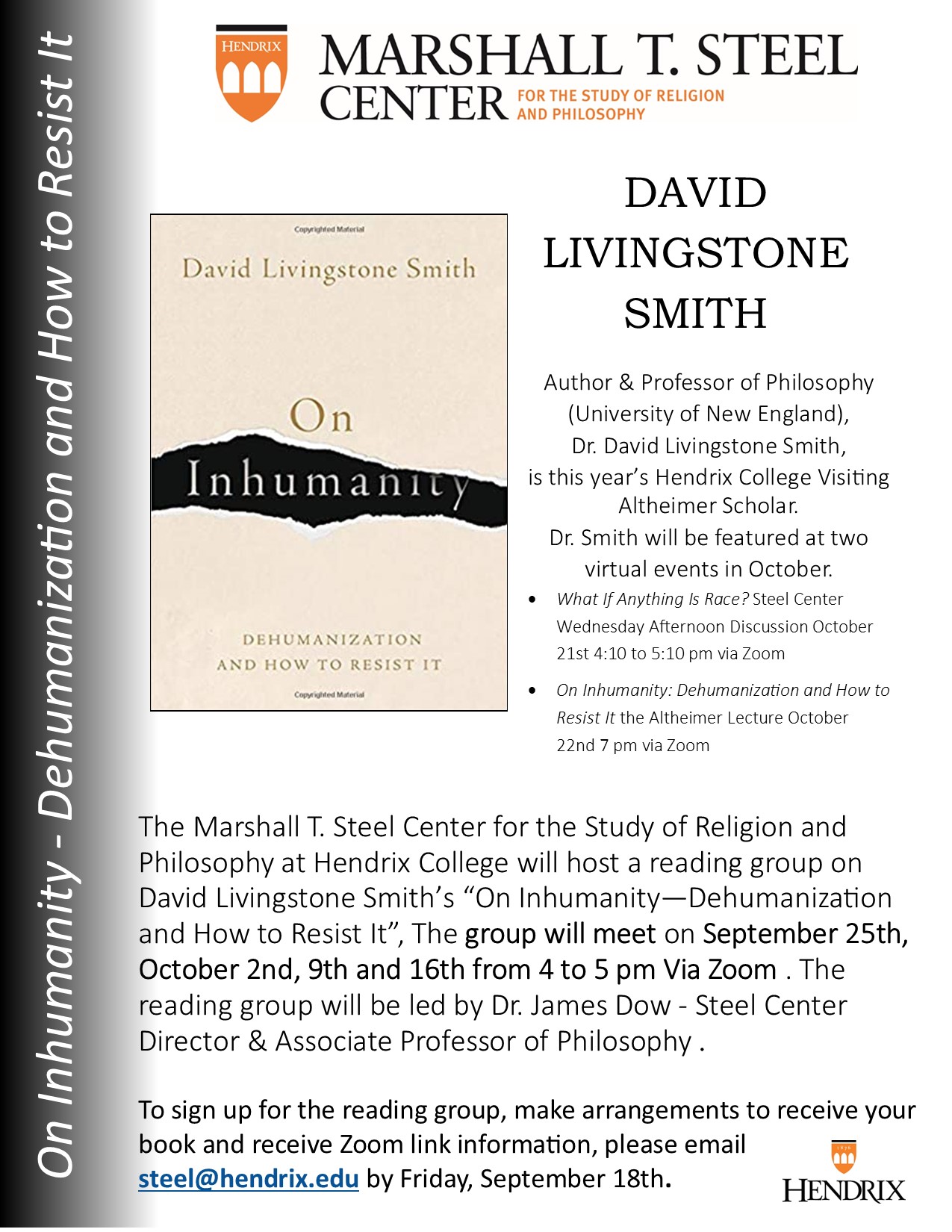
Visiting Altheimer Scholar – Dr. David Livingstone Smith, Author and Professor of Philosophy (University of New England)
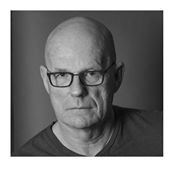
Altheimer Lecture – On Inhumanity: Dehumanization and How to Resist It
Thursday, October 22nd at 7pm. We will be hosting this event via Zoom and livestreaming it to our Facebook page. To register in advance, please email steel@hendrix.edu.
One evening, Rudolf Höss, the commander of the Auschwitz extermination camp, was sipping wine with his brother-in-law Fritz. Fritz asked him what the termsubhuman meant. “Look, you can see for yourself,” Höss, replied, “They are not like you and me. They are different. They look different. They do not behave like human beings.” The Holocaust, the enslavement and brutal lynching of Black Americans, and many other atrocities, were fueled by such dehumanizing beliefs. Drawing on ten years of research, and using real examples, Dr. Smith will explain how dehumanization works, focusing on its close connection to racism, its psychological dynamics, and what we need to do to resist and combat its toxic power. -Dr. David Livingston Smith
Visit the FB event page https://www.facebook.com/events/344143183489537
Dr. Smith will also be leading the Steel Center Wednesday Afternoon Discussion What, If Anything, Is Race? on October 21st at 4:10 pm. Visit https://www.hendrix.edu/steelcenter/wednesdayafternoon/ for more information.
David Livingstone Smith is Professor of Philosophy at the University of New England in Biddeford, Maine. He has written or edited nine books, including Less Than Human: Why We Demean, Enslave and Exterminate Others (St. Martin's Press, 2011), which won the 2012 Anisfield-Wolf award for nonfiction and his latest book, On Inhumanity: Dehumanization and How to Resist It. His work has been translated into seven languages. David is an interdisciplinary scholar, whose publications are cited not only by other philosophers, but also by historians, legal scholars, psychologists, and anthropologists. He has been featured in several prime-time television documentaries, is often interviewed and cited in the national and international media, and was a guest at the 2012 G20 economic summit, where he spoke about dehumanization and mass violence.
2020 Events
Philosophy Flicks
Inside Out
Friday, March 6th, 2020
@6pm in Ellis Hall
Everyone is welcome! Popcorn and beverages will be provided!
.png)
A Clockwork Orange
Monday, March 30th, 2020
@6pm in Ellis Hall
Everyone is welcome! Popcorn and beverages will be provided!
.png)
The Lorax
Monday, April 6th, 2020
@6pm in Ellis Hall
Everyone is welcome! Popcorn and beverages will be provided!
.png)
Ellis Study Hall

Beginning January 28th, the Steel Center will host a study hall period in Ellis Hall. Study Hall will take place on Tuesday evenings throughout the spring semester from 6 pm to 8 pm. A student attendant will be present at all times. Study Hall is open to any Hendrix student.
Let’s Talk About Beauty: Invitations and Aesthetic Discourse
November 7th in Mills B
Normative discourse, or talk of what we ‘ought to’ or ’should’ do, is often said to be distinctive in aiming at convergence. When we talk about what we ought to do, think, believe, or feel, the thought goes, we aim to get everyone on the same page and ‘converge’ in our beliefs, feelings, plans, etc. While this might be true of some normative domains, I argue that it is not true of the aesthetic. Like much moral discourse, typical aesthetic claims seem to express feelings or have prima facie imperatival force. But, as I argue, the conversational aims aesthetic discourse are distinctive. A symptom of this is the special type of speech act we typically perform in aesthetic discourse. Understanding the speech act requires understanding the force of aesthetic imperatives, and among the several options a few stand out: demand, request, recommendation, and invitation. To adjudicate between these options, I present an account of the normative character of aesthetic discourse and argue that the invitation reading fares best. On this view, typical aesthetic claims include invitations to appreciate. It turns out that the ‘end’ of aesthetic discourse is community, in a sense, not convergence, and so we should reject theories of aesthetic conversation that emphasize convergence.
Led by Nick Riggle, Author and Assistant Professor of Philosophy at University of San Diego
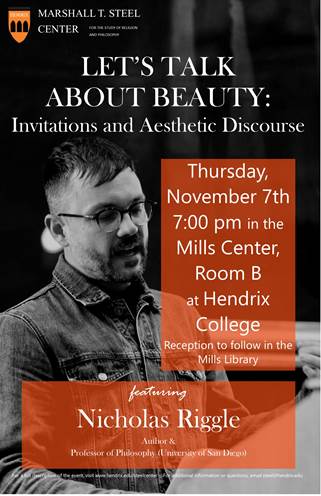
Ellis Hall Exhibit:
The Anthropogenic Sublime
Hurricanes, floods, droughts, and tornadoes produce sublime experiences of nature being bigger than us, more powerful than us, and beyond our comprehension. But, once we acknowledge human-caused changes in the natural environment in the Anthropocene, how do we use art to express the sublimity of natural environments? Works in The Anthropogenic Sublime approach questions about the boundary between humans and nature, about activity and passivity, and about how we express and represent ourselves, our environments, and nature in an era of human caused changes to the natural environment.
OPENING – Friday, September 27th 5 -7 pm in Ellis Hall This is a come and go event featuring the works of six artists with a guided walk through at 6 pm.
The exhibit will be open in Ellis Hall from September 2019 – August 2020.
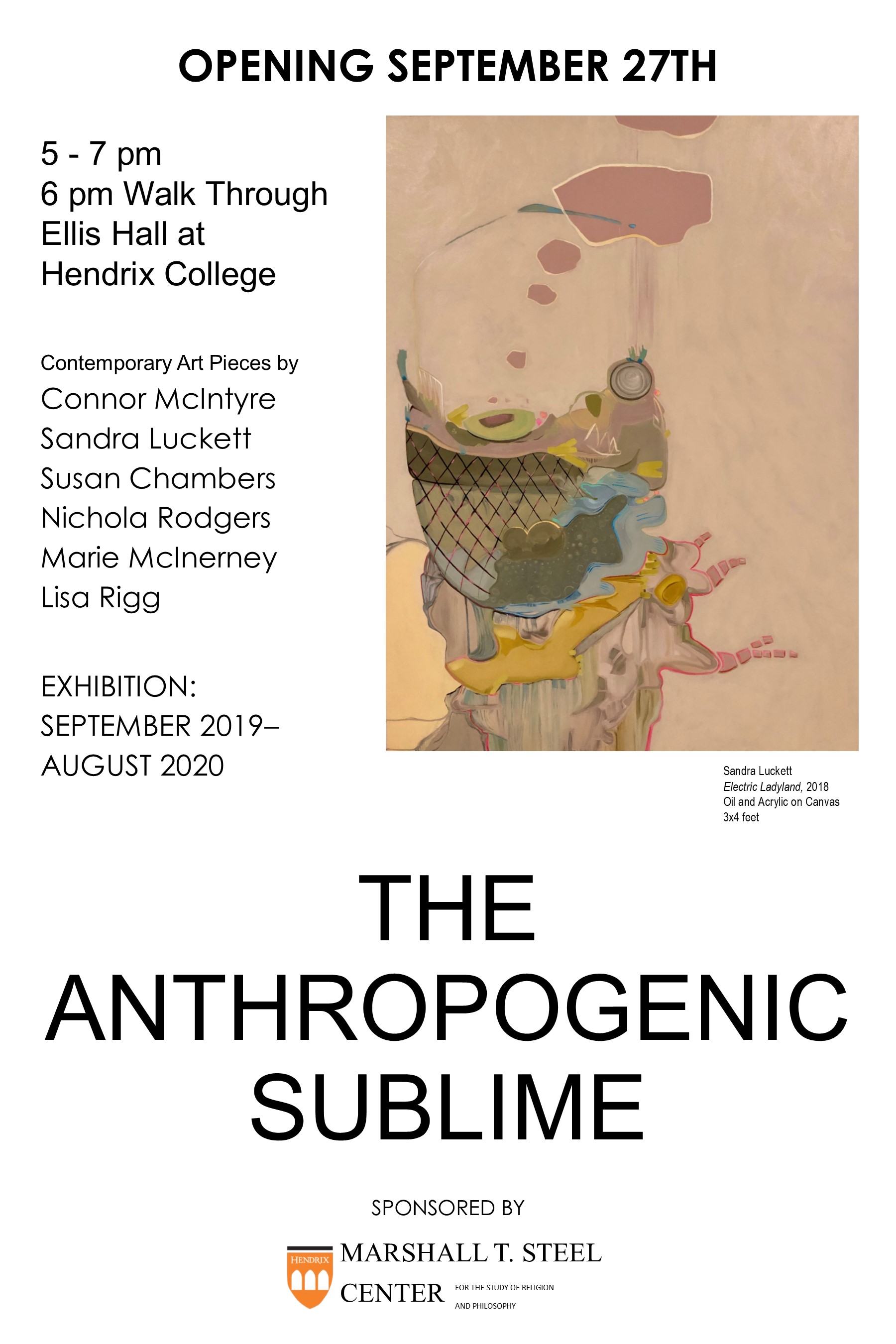
Lecture and Brunch
Thursday, September 19th, 2019
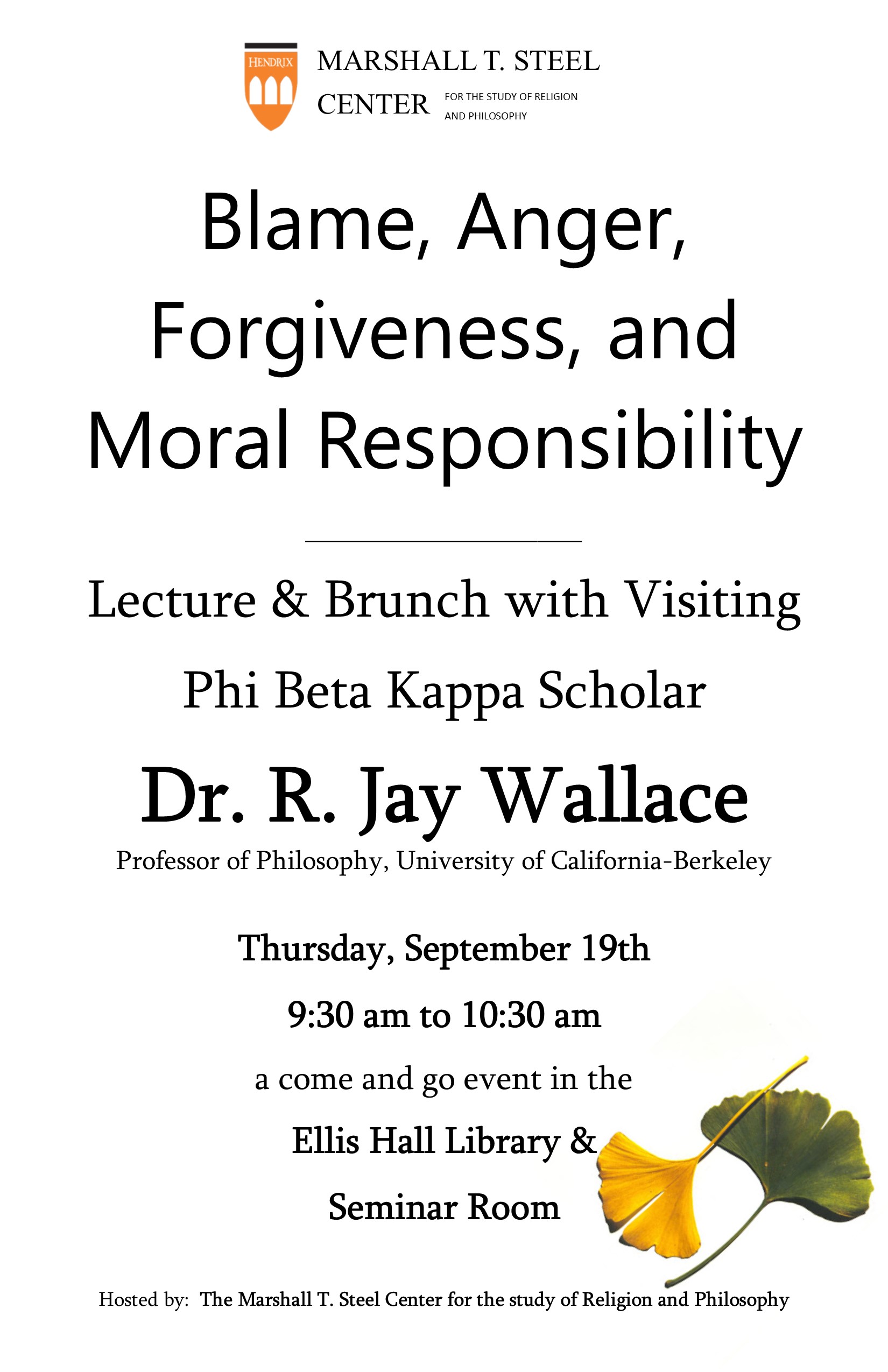
Reading Group
Led by Dr. James Dow
Contact steel@hendrix.edu for your free copy of the book!
*while supplies last*
